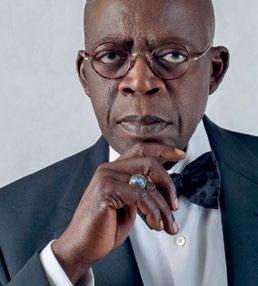




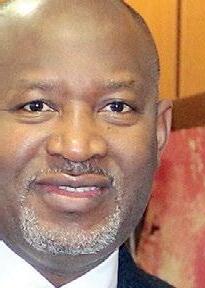
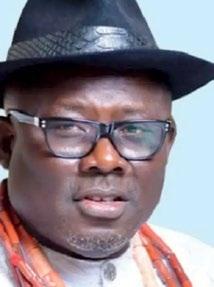


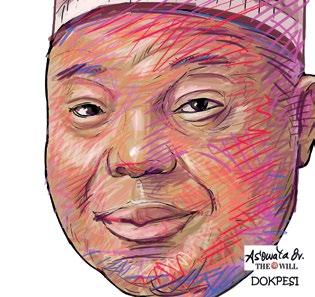
www.thewillnigeria.com THEWILLNIGERIA THEWILLNG THEWILLNIGERIA FUEL SUBSIDY IS GONE: Price: N250 JUNE 4, 2023 • VOL . 3 NO. 24 PAGE 38 The Master Strategist Who Plotted His Way to The Presidency … pages 44-45 BOLA AHMED TINUBU Nigeria Air: Tragedy of N85bn Rot Buhari Left Behind Governors Assume Office, Promise Development Why Fraudulent Scheme Must Not Return RAYMOND ALEOGHO DOKPESI: NEW RAY IN NIGERIAN BROADCAST MEDIA PAGE 10 PAGE 32
Growing up with basic amenities can easily be taken for granted, but only some are blessed to have the basics available to them. For some people, a roof over their head, food, and clothing is a luxury. This is the situation the kids at Dream Catchers Academy, run by Seyi Oluyole, found themselves in before they were taken off the streets and into a home. There they are homeschooled and provided with sustainable skills in art and entertainment to empower them to be financially independent in the future. Read their story on pages 8 through 10.

This week’s entertainment page features a book, a music album and a movie you must see in Listen. Read. Watch. Expect to see more of this.





Pairing your makeup with your outfit is more challenging than it may seem. It takes skill and knowledge to accomplish this, but not to worry; we have you covered with a simple guide that will put you through quickly. See pages 12 and 13.


Our food page, Bon Appetit, has some alternatives for those who are lactose intolerant, so check out page 14.
The movie review page criticises The Little Mermaid, and from what I have read so far, I’m not as eager to watch it based on this review as I was after watching the preview. If you see it, let us know what you think. Don’t forget to scan the QR codes.




Until next week, enjoy your read.


JUNE 4, 2023 THEWILL NEWSPAPER www.thewillnigeria.com PAGE 2 THEWILLNIGERIA THEWILLNG THEWILLNIGERIA
Photo: Kola Oshalusi @insignamedia Makeup: Zaron
OnahNwachukwu
@onahluciaa +2349088352246 Digital IS NOW WHOLLY Scan the QR Code to Download current edition Scan The QR Code to Read on Website Or Visit www. thewilldowntown.com Scan The QR Code to Read on Issuu New Edition Available Every Sunday @ 6am Nigerian Time
OnahNwachukwu Editor, THEWILL DOWNTOWN




JUNE 4, 2023 THEWILL NEWSPAPER • www.thewillnigeria.com PAGE 3 THEWILLNIGERIA THEWILLNG THEWILLNIGERIA







JUNE 4, 2023 THEWILL NEWSPAPER • www.thewillnigeria.com PAGE 4 THEWILLNIGERIA THEWILLNG THEWILLNIGERIA
FUEL
COVER
BY AMOS ESELE WITH SAM DIALA, UKANDI ODEY, DAVID OWEI, UDEME UTIP, JOHN AGBO, AMOS OWEI AND ANIEKAN BASSEY
There is palpable tension in government and public circles, following the fall out of the fuel price increase announced by the Nigeria National Petroleum Company limited, NNPCL, at the behest of the Federal Government, a few hours after President Bola Ahmed Tinubu announced, off the cuff, on May 29 that “fuel subsidy is gone.”

A senior government source told THEWILL that the decision of the Nigeria Labour Congress, NLC, to embark on a nationwide strike on Wednesday was being carefully studied, given the yet- to wear-off post-election disputes and controversies, even as the government would stick to its decision on ‘subsidy removal’.
The anxiety in government circles is connected with the tough position adopted by the NLC at the last Wednesday meeting between its leaders and the Federal Government at the Presidential Villa, which ended in a deadlock, and a looming nationwide strike.
Details of the meeting obtained by THEWILL showed that apart from the fait accompli situation presented by the government’s pre-meeting decision on the price hike, the labour leaders’ unanswered arguments forced each party to take hard positions. The main thrust of the argument was that the



government had always subsidised the rich and passed the bill to the poor.
A source at the meeting said that while labour leaders substantiated their arguments with facts, the government insisted that palliatives would be funded from the $800 million loan obtained from the World Bank by the immediate past administration less than a month ago.
Explaining further, the source mentioned some of the freebies for the rich, such as duty waivers worth N16 trillion that was given to businesses with nothing to show for it; the N13 trillion given to electricity companies that are supposed to be privately run and the N5.4 trillion loan owed by 380 debtors to banks that are being managed by the Asset Management Corporation of Nigeria, AMCON since 2015.
“It is this kind of subsidy for the rich and incompetence on the part of the government, which has made the refineries not to work, that is the source of the problem,” the source told THEWILL on condition of anonymity.
Sources say that many labour leaders felt let down by the President, who, being a democrat, was expected to prefer dialogue to the monologue instigated by his announcement of the removal of subsidy during his inauguration.
“We expected him to settle into office, study the
THEWILLNIGERIA
books and even ask for a supplementary budget, if necessary, then consult widely with stakeholders before launching headlong into the subsidy removal in a country in which minimum wage is N30, 000,” one of the sources told our correspondent.
DIVIDED OPINION
Set apart, the new price increase in petrol sounds logical and makes a lot of economic sense as it would ensure that the prices of petroleum products reflect market realities.
But against the background of the prevailing harsh economic realities in the country, following high unemployment rate (33 million persons are without jobs) and galloping inflation at 21.91 per cent, according to global consulting firm, KPMG in April 2023, as well as rising food prices amid 153 multidimensionally poor people out of an estimated 200 million population and negative Gross Domestic Product at 8 per cent, the fuel price increase will have a multiplier effect on the economy with an increase in production costs for the real sector, that would eventually be passed to the consumers with very low purchasing power.
Even so, opinions are divided on the pros and cons of the new policy. A professor at the Nasarawa State University, Keffi, Uche Uwaleke, told THEWILL that due to its huge cost on the economy, the removal of the fuel subsidy was long overdue.
JUNE 4, 2023 THEWILL NEWSPAPER • www.thewillnigeria.com PAGE 5
THEWILLNIGERIA THEWILLNG
Why Fraudulent Scheme Must Not Return SUBSIDY IS GONE:
...Fraudulent Scheme Must Not Return
Prof Uwaleke said that fuel subsidies have proven to be unsustainable, but he urged the Federal Government to be cautious in implementing the new price regime on petrol.
“However, in order to minimise its negative impact on the livelihoods of Nigerians, the issue of fuel subsidy removal should be handled with care. This negative impact includes higher inflation and poverty rates in the short term, leading to demand for higher wages.
“If not well handled, it may also result in social unrest. So, stakeholder engagement is required and compensation measures put in place before implementing it, using a phased approach,” he said. In the same vein, a former Director-General of the Lagos Chamber of Commerce and Industry and currently Director/CEO, Centre for the Promotion of Private Enterprises (CPPE), Dr Muda Yusuf, expressed support for the new price regime under a guided and well-managed supervision and regulation.

“Admittedly, the increase was quite high. And the shocks on citizens were enormous as well. But these are some of the inevitable costs of reforms. And we need reforms to prevent the collapse of the economy. Apparently things have to get worse before it gets better,” he told this newspaper.
Yusuf said things would be painful initially, but they would progressively get better. As the supply side response improves, he argued, the prices will moderate.
That said, he added, the government needs to urgently put immediate and short-term measures in place to mitigate the pains of the sharp increases in transportation costs on the citizens.
“Food and transportation account for over 50 per cent of the household budget of the poor. Something urgent needs to be done. Such measures should focus on reducing the cost of food, provision of cheaper public transportation options, improving power supply to reduce demand for fuel for electricity generators, incentives to promote the use of auto gas, reduction in import tariffs for intermediate products for food processing companies, eliminating taxes and levies on all agricultural inputs to boost food production and reduction in import tariffs on mass transit buses, among others,” he canvassed, adding, “NNPCL PMS pricing should be at least 15 per cent less than the prices of private fuel stations. This is necessary to signal social sensitivity by the government.”
However, an oil and gas expert, Bala Zaka, however, underscored the role of the government in upholding a form of pro-people subsidy regime in the country.
According to him, no government can operate from its people. Arguing that there is a subsidy in Public Education, Public Health and Public Transport, he warned that the impact of fuel subsidy removal could consume Nigerians because the economy would be incapable of absorbing the resultant shock.
Similarly, the Nigerian Employers’ Consultative Association (NECA) called on the Federal Government to approach the removal of petrol subsidy strategically in order to avoid the escalation of inflation and worsening of already bad socioeconomic indicators, such as employment and poverty per capita income, among others.
But the Major Oil Marketers Association of Nigeria (MOMAN) advised Nigerians to adjust themselves to the new reality for the good of the country’s economy.
For the NNPCL, the N400 billion monthly subsidy,


with which it had supported the government, has been a back breaking experience. Lamenting that the Federal Government still owed the company N2.8 trillion on petrol subsidy, the Group Chief Executive Officer of NNPC, Mele Kyari, disclosed that since 2022 when it provided the government with the sums of N6 trillion and N3.7 trillion in 2023, the company was yet to receive any payment whatsoever from the federation.
He said, “That means the Federal Government is unable to pay and we have continued to support this subsidy from the cash flow of the NNPC. That is, when we net off our fiscal obligations of taxes and royalties, there is still a balance that we are funding from our cash flow. And that has become very difficult and it is affecting our other operations.”
FRAUDULENT SCHEME
The House of Representatives in June 2022 alleged that more than $10 billion worth of the nation’s crude had been stolen via fraudulent fuel subsidy claims by the Nigerian National Petroleum Corporation (NNPC) and other industry stakeholders between 2017 and 2021.
The importers ship a huge portion of the product across the borders and sell it at exorbitant price at the expense of the people.
The crude-petrol swap denies Nigerians of the byproducts of crude which the NNPC negotiates away for the benefits of the refined product supplier.
REACTIONS ACROSS THE COUNTRY
In Plateau State, sharp reactions, bitterness, disappointment and utter condemnation have continued to trail the President’s inauguration statement.
Many condemn the policy for its hasty implementation and devastating effect on the value of the national currency. To this group, President Tinubu failed to consider the macro negative consequences of the policy on a wide range of issues, especially the purchasing power of citizens
before "making the erratic pronouncement".
Austin Egili, Executive Secretary of the Manufacturers Association of Nigeria, MAN, decried the policy and pointed out that it has worsened the degenerate situation in the manufacturing sub-sector. According to him, before now, manufacturing was under bad weather, with a lot of industries shutting down completely or closing several production lines and only managing to stay afloat.
With the total removal of subsidy, he said, the sector will have to grapple with the worst in operational costs and maintenance of standards. He noted that personnel servicing and high cost of operations cannot help the sector to thrive and contribute meaningfully to the growth of the economy.
Barrister Adamu Madaiki, a lecturer in the Faculty of Law, University of Jos, shared Egili’s concern, as he pointed out that the enforcement of total removal of fuel subsidy has devalued the national currency by more than 200 per cent. According to Madaiki, savings in the banks have automatically crashed in value, as 500 naira, for instance, can no longer exchange for the same service or goods it could last week. Madaiki will rather the subsidy be withdrawn in phases, while a cushioning regime is being developed.
Yet, there are others who support the policy as President Tinubu unfolds it, saying it is now or never and citing the argument that subsidy was merely so called because it was beneficial to a few privileged people who usurped and misappropriated its purpose at the expense of the masses.
In Abakaliki, the Ebonyi State capital, many who spoke to our Correspondent said that Nigerians were already used to such unusual policies as the sudden fuel price increase and its consequences, adding that the only option they had was to adjust. While Chukwuma Ejiofor, a civil servant, said he had since dumped his car and braced himself to trek the long distance to and from work because commercial motorcyclists and Keke Napep have jerked up their fares, Matthew Ebubedike, a businessman, said the fuel subsidy removal had been long expected, but the immediate past government in the country was playing politics with it.
"Let us face the consequences once and for all. Whatever it is, I know we must survive, because there is no situation that has not befallen this country.
"It is not a funny situation at all. The economy is biting harder. It was a bad start for the just inaugurated administration of President Bola Ahmed Tinubu. But we have no choice than to adjust", he said.
In Akwa Ibom State, the independent and major oil marketers reacted differently to the detriment of consumers. Many of the petrol filling stations in the capital, Uyo, especially those belonging to independent marketers, shut down, with petrol selling for N600, N89 higher than the new price of N511.
Worse still, kerosine rose from N400 to between N800 and N900, just as interstate transport fares went up by 100 per cent and inter-city fares rose to 50 per cent.
It took the interventions of the Governor of Bayelsa State, Diri Duoye and his Cross River State counterpart, Bassey Otu, to calm the frayed nerves of restive citizens protesting the hoarding of fuel by marketers who were bent on cashing in on the situation to make brisk business through higher prices over the prevailing price of N250 per litre.
Governor Duoye threatened to shut down any filling station selling above the fixed price while residents
JUNE 4, 2023 THEWILL NEWSPAPER • www.thewillnigeria.com PAGE 6 THEWILLNIGERIA THEWILLNG THEWILLNIGERIA
COVER
Admittedly, the increase was quite high. And the shocks on citizens were enormous as well. But these are some of the inevitable costs of reforms. And we need reforms to prevent the collapse of the economy. Apparently things have to get worse before it gets better,” he told this newspaper.
“
Yusuf said things would be painful initially, but they would progressively get better. As the supply side response improves, he argued, the prices will moderate
...Fraudulent Scheme Must Not Return
groaned under the rising cost of business operations caused by marketers profiting from the situation. To check the emerging trend in Cross River, Governor Otu had to set up a 12- Man Task Force to put the marketers in check.
The governor said the marketers ought not to have increased the price because the fuel in their stations and tank farms had been subsidised and full subsidy would commence later in the month. However, 24 hours after the Task Force was set up, its impact is yet to be felt as most filling stations within the metropolis still sell the product between the fixed price of N511 and N520 per litre.
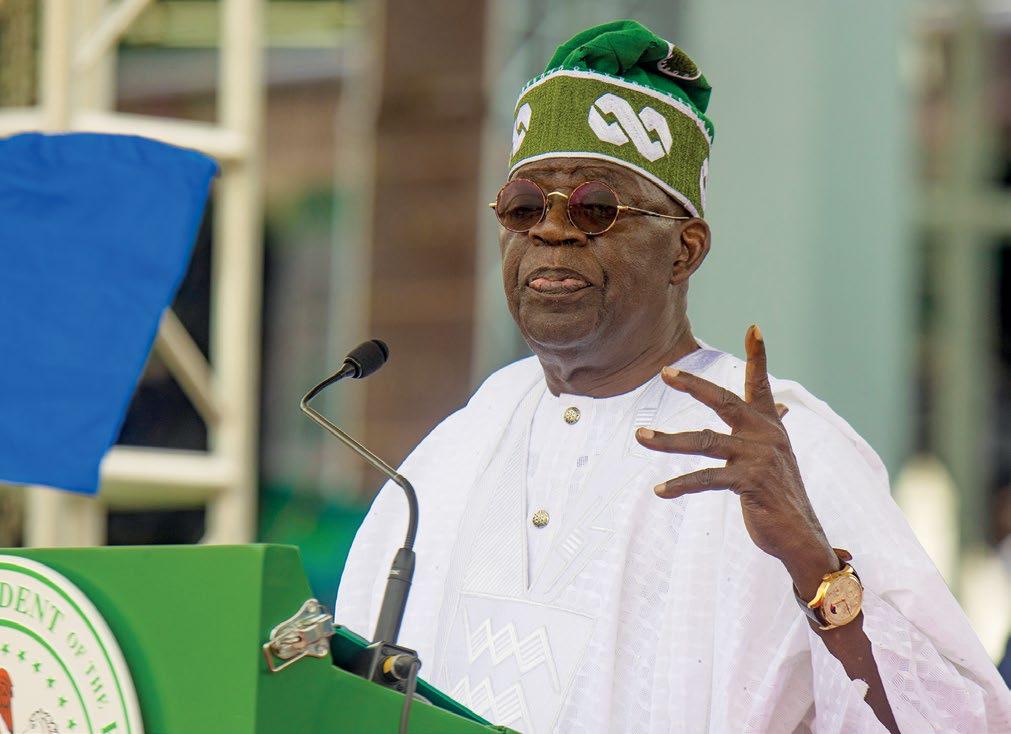
In Edo State, where a protest against arbitrary increase in fuel price had been ongoing for some time, the price hike added fuel to the protest, leading to the disruption of traffic on the Benin-Lagos Road, blocked by protesters.
NLC MOBILISES AFFILIATE TRADE UNIONS
In the wake of these growing reactions from the states, the NLC’s Wednesday ultimatum to the Federal Government to reverse the increase in the pump price of fuel has a fertile ground to sprout the planned nationwide protest. Investigation by THEWILL shows that the NLC is bent on holding the strike through mass protest for these key reasons. First is to shore up its declining image among Nigerians who had come to see the body as capable of barking and not bite, following many instances when it called for strike action under similar situations in the past but caved in easily to the government afterwards.
Secondly, the NLC wants to strengthen its 48 affiliate members through mobilisation in order to give each of them significant roles to play in their various capacities, while using them to liaise with civil society organisations, the National Associations of Nigerian Students, NANS, grassroots support groups and finally to use protest marches to boost the strike.
FG DEEPENS ACTION BY SCRAPPING PETROLEUM EQUALISATION FUND
On Friday evening, the Federal Government took further steps to consolidate its position. It scrapped the Petroleum Equalisation Fund (PEF), as well as the national transport allowance for oil marketers.
Engr. Farouk Ahmed, the Authority Chief Executive (ACE) of the Nigerian Midstream and Downstream Petroleum Regulatory Authority (NMDPRA) confirmed the position.
The PEF was set up by Decree 9 of 1975 (as amended by Decree Number 32 of 1989 now chapter 352 of the Laws of the Federation). Its main function is to ensure price uniformity of petroleum products via the reimbursement of marketers for losses incurred while trucking products from depots to filling stations anywhere in Nigeria.
Explaining further, Ahmed said the NMDPRA would no longer fix prices or release templates for petrol prices. He explained that under the liberalised market, the forces of demand and supply would dictate prices.
He however disclosed that the NMDPRA and the Federal Competition and Consumer Protection Commission (FCCPC) would monitor activities in the downstream sector to prevent profiteering by petroleum marketers.
He said, “We put the regulation in place, we make sure quality control is complied with, we make sure the product is there and we give licence to a prospective importer.
“The market is now open for everybody that wants to import as long as they meet all the requirements. So, it is not about the NNPCL alone.
“For everybody in the sector, we make sure we guide their operations whether at the depot or wherever the product is, but we will not put a cap to say this is what the price must be.
“As far as we are concerned in the NMDPRA, this is not like the past when the PPPRA fixes the price. In a deregulated market, it is the market force that dictates the price.
“In the case of the NNPCL, the organisation is the sole importer at this point. We told the NNPCL to recover its costs because they know how much it cost them to import the product and sell it.
“Of course, we also know how much shipping, offshore, ex-depot and ex-pump are. But we cannot tell them to sell at a price because the market is deregulated", he said.
Ahmed further disclosed that marketers are now free to source their foreign exchange anywhere around the world to import petroleum products and then recover their costs without impediments.
On where the importers will source their forex from, Farouk said: “No, the CBN will not give dollars to anyone because it is an open market. Anyone willing to import should get the dollars from anywhere to import.
“Anyone willing to open a letter of credit from any part of the world can do that to import. That marketers can source their forex from anywhere is the beauty of the liberalised market that the NMDPRA has introduced based on the provision of the law.”
Although no template spells out the pricing components of petrol price, Ahmed hinted that the market will henceforth be modulated to allow the fluidity of prices.
“This means that the price will no longer be static. It will depend on the international price of the gasoline market. But this does not imply that marketers can sell at any price.


“If we find that certain prices are way above the expected profit margin, we and the FCCPC can move in to curb such excesses because that will be profiteering. The market structure will dictate the price swings at every point in time", he added.
On the role of the Dangote Refinery in all of these, he maintained that a private refinery will help the nation in two ways, adding, “The refinery will give Nigeria easy access to petroleum products on-land for security reasons because it is within Nigerian territory.
“Secondly, it will increase employment for our professionals.”

JUNE 4, 2023 THEWILL NEWSPAPER • www.thewillnigeria.com PAGE 7 THEWILLNIGERIA THEWILLNG THEWILLNIGERIA COVER
Let us face the consequences once and for all. Whatever it is, I know we must survive, because there is no situation that has not befallen this country.
“
It is not a funny situation at all. The economy is biting harder. It was a bad start for the just inaugurated administration of President Bola Ahmed Tinubu. But we have no choice than to adjust
Tinubu
Tinubu Assures Of Better Minimum Wage, Says Welfare, Security of Nigerians Top Priority
BY AINA OJONUGA
President Bola Ahmed Tinubu, in Abuja, on Friday, said the improved livelihood for Nigerians remains the top priority of his administration, with more people-focused economic policies, assuring that the national minimum wage needs a review to reflect realities.
The President, who received members of the Progressive Governors’ Forum (PGF), led by the Chairman, Hope Uzodinma of Imo State, at the State House, said the national and sub-national governments will work together on the minimum wage, which already requires “soul searching.’’ “We need to do some arithmetic and soul searching on the minimum wage,’’ he said. “We will have to take a look at that together, and the revenue. We must strengthen the source and application of our revenue.’’
In a statement issued by Abiodun Oladunjoye, Director of Information, Tinubu urged the governors to seize the opportunity of being chosen among millions of citizens in their states to make a difference in the lives of people, adding that he will work for the benefit of Nigerians.
“This meeting is not strange to me, and the content of the meeting is so valuable.
The camaraderie is very stimulating. This is about the Nigerian project, not Bola Tinubu”, he said.
The President said that the multiple exchange rates will be streamlined, noting that governance was a continuum.
“I have inherited the assets and liabilities of my predecessor. This is the first time you entered the Council Chambers, and it is my first time too for a meeting.
“As progressives and thinkers under the umbrella of the All Progressives Congress (APC), you have a role to play in educating our people and making sure we manage ourselves", the President told the governors.
President Tinubu said it was a good and encouraging sign that the APC has a majority in the National Assembly and

Otiono’s Poetry Collection

Wins ALA Africa Best Book Prize
BY CHUX OHAI
The African Literature Association (ALA) Annual Conference ended last Saturday with an award ceremony in Tennessee, USA. Nigerian writer and scholar, Nduka Otiono, won the association’s Best Book of the Year Award 2023, for his book, DisPlace, a collection of poems on the weight of exile on the poet in the western world.
Chief of Staff: Gbajabiamila to Assume Office on June 14
some Houses of Assembly, which will make it easier to develop policies that will directly impact the economy and the people.
“If we work together, the Nigeria of our dreams is not far away. Rest assured that we will not have multiple exchange rates anymore. You asked for this meeting, and I had to set aside time to be here.
“We have a political party that we will need to manage, whichever way, we have inherited assets and liabilities, and we cannot complain", he stated.
President Tinubu said he would maintain an open-door policy, willing to entertain issues, deliberate, and collectively find solutions to the challenges facing the country, including security.
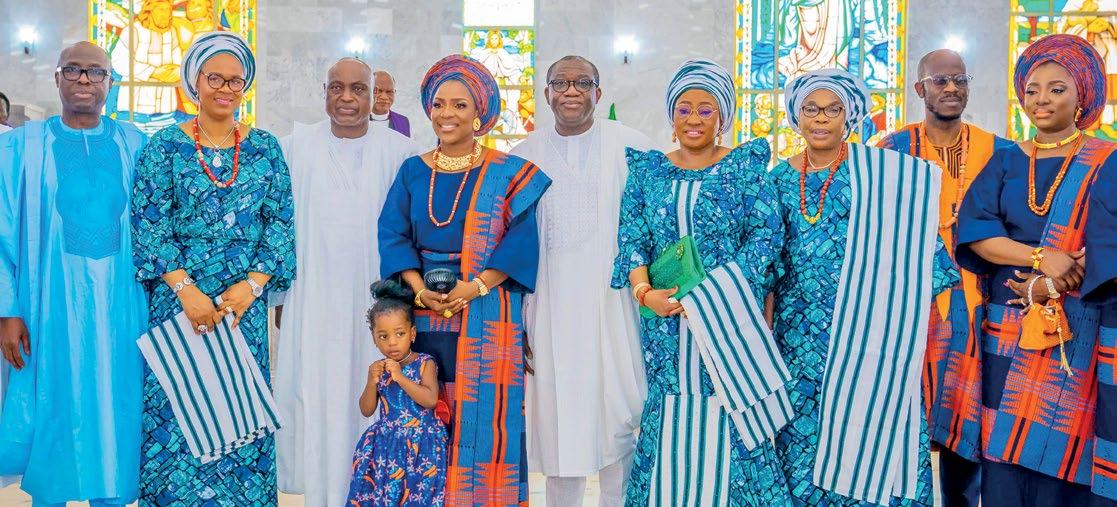
“It is in our hands, and I am ready to work and listen at any time", he added.
In his remarks, the Vice President, Sen. Kashim Shettima, called on the governors to rally around the President as he tackles the challenges that stagnate the economy, like the oil subsidy and multiple exchange rates.
“Let us rally around the President and not bulge, there are vested interests that may want to resist the subsidy removal. Its removal will free resources for the development of your states", he added. Earlier, the Governor of Imo State pledged the support of the Progressive Governors to the President, noting that the initial decisions already foretell good intentions for the economy.
“We are here today as members of the APC to fraternise with you as our leader, and congratulate you on your election as President, and Commander-in-Chief.
“We are using this opportunity to express our support for you at this trying time in our history", he said.
Uzodinma noted that the President had started well by placing the economy and welfare of the people on a priority list, with honesty of purpose.
BY AYO ESAN
The Speaker of the House of Representatives, Rt. Hon. Femi Gbajabiamila, has expressed his gratitude to President Bola Tinubu for finding him worthy to be appointed as his Chief of Staff, promising to give his best when he assumes office on June 14, 2023 as contained in the President's official letter.
Speaking through his twitter handle @ femigbaja, Gbajabiamila said: ''Thank you Mr. President@officialABAT for finding me worthy of being your Chief of Staff.
“Having spent the last 20 years in the Nigerian Parliament, and after winning my 6th term election into the National Assembly, I shall work with Mr. President in discharging the enormous task ahead of him for the peace and progress of the Federal Republic of Nigeria.
“I shall give my best when I take office on June 14, 2023 as reflected in Mr. President‘s official letter. “
THEWILL gathered from a competent source that the resumption date of June 14, 2023 was arrived at by President Tinubu to ensure that Gbajabiamila completes his tenure on June 11, 2023, when the Ninth National Assembly will wind up and not to give room for the control of the House by his deputy, Hon. Idris Wase, who has been openly hostile to Gbajabiamila in recent times.
A competent source told THEWILL that the President chose the June 14 date “Given the situation in the House where Gbajabiamila and his deputy, Hon. Idris Wase, are openly not on good terms, The president doesn’t want a situation where the Speaker will leave the affairs of the House to an ‘enemy’. It is to avoid this scenario that Tinubu delayed Gbajabiamila’s resumption to the office of Chief of Staff to June 14.''.
Gbajabiamila’s connection and experience will also be required in the election of the presiding of the 10th National Assembly as many of the legislators are opposed to the chosen candidates for the various leadership positions by the president.
The ALA said that DisPlace clinched the prize "for an outstanding book of literature by an African writer published last year."

In his acceptance speech, Otiono said: “DisPlace is a testament of these tributaries of the self, as well as a verbal collage of the flow of the river from my hometown Ogwashi-Uku in the Anioma area of Delta State, Nigeria, to the wide expanse of Obodo Oyibo. “Obodo oyibo is the Igbo word for the western world. It was first meant for Europe before the western hemisphere of Europe and Canada was added to it.
“DisPlace is a witness to the acclamation that poetry, in the words of the prolific American-Canadian poet, A. F. Moritz, can become the world we actually live in, not just in verse, but on both sides of our front door.
“Both sides of our front door’ is a metaphor for what has been termed ‘The Dualities of Nduka Otiono.’ These dualities extend to my identity as an African Canadian and the various lives that I have lived and continue to live. As I affirm elsewhere, the elements of my dualities are ‘the branches of a river, flowing into one mainstream,’ which ‘reflect the work that I do as a creative writer, as a scholar, as an educator’.”
Otiono expressed his gratitude to the African Literature Association (ALA) for the award; his publisher, Wilfrid Laurier University Press, publishers of Canada’s foremost poetry series and Carleton University, his employer, for providing him with the platform to thrive as an instructor, interdisciplinary scholar and creative artist.
He noted that the book was completed against the storm of the COVID -19 pandemic that snuffed out millions of lives across the globe.
The former General Secretary of the Association of Nigerian Authors added: “It is a testimony to the human capacity for resilience and a creative and robust response to tragedies embodied in the triumph over the pandemic, that life has returned to its pre-pandemic socialisation status. Such, too, is the power of poetry as a healing balm that uses words and sounds."
JUNE 4, 2023 THEWILL NEWSPAPER • www.thewillnigeria.com PAGE 8 THEWILLNIGERIA THEWILLNG THEWILLNIGERIA
L-R: Former Governor of Ekiti State, Otunba Niyi Adebayo; Ekiti State First Lady, Dr Olayemi Oyebanji; Governor of Ekiti State, Biodun Oyebanji; eldest child of the deceased, Mrs Bolaji Olagbaju; immediate past Governor of Ekiti State, Dr Kayode Fayemi; his wife, Erelu Bisi Fayemi; Deputy Governor, Chief (Mrs) Monisade Afuye; children of the deceased, Adegboyega and Doyin, during the burial service for former Deputy Governor of the state, Otunba Bisi Egbeyemi, at the Cathedral Church of Emmanuel, Ado-Ekiti on June 2, 2023.
NEWS
Tinubu Commissions NASS Central Mosque, Counsels Muslims on Humility
President Bola Tinubu on Friday, commissioned the National Assembly Central Mosque urging the Muslim Faithful to exhibit humility in their daily living.
Tinubu, who was represented by VicePresident Kashim Shettima, called on the Ummah to “walk the earth with humility.
“Fifty years from now, half of the Assembly members will not be around and very few people will know that we existed. So we should work the earth with humility.
“As much as possible, let us strive to be humble and as much as possible let us strive to be kind to each other.
“Power, wealth are gift from Allah to humanity. May Allah make our contributions toward the construction of this mosque a blessing.
“Even if we are gone, reward from the
EFCC Lacks Constitutional
construction of this mosque will follow us,” he said.
He felicitated with the Muslim Ummah in the National Assembly for contributing resources in building the edifice.
The President recognised the crucial role played by the President of the Senate, Ahmad Lawan, and the Speaker of the House of Representatives, Femi Gbajabiamila, in the construction of the mosque.
“I recognise their contributions without whose consent not a single erection plan would have been effected for the construction of the mosque.”
Similarly, the Sultan of Sokoto and President, Nigeria Supreme Council for Islamic Affairs, Sa’ad Abubakar III, felicitated with the Muslims on the realisation of the construction of the mosque.
Otu Pledges to Address Calabar's Sanitation Crisis
Governor Bassey Otu of Cross River State has pledged to address the sanitation crisis plaguing Calabar, the state capital, and restore its clean and sparkling status.
The governor gave the assurance shortly after inspecting the dump site located along Lemna Road in Calabar Municipality. He said he would tackle the environmental problem of Calabar and restore its past glory as Nigeria's cleanest state capital.
“I decided to come to the dump site to personally appraise the situation on ground first hand and from what I have seen here, it's quite pathetic.
"I must act immediately to address all issues hindering refuse collection, evacuation and proper dump in line with global practices.
"We are putting a proper arrangement in place to relocate the dump site from the city, but in the mean time the site must be manage properly.
"So, my presence here is to assess the
FG Scraps Petroleum Equalisation Fund
The Federal Government has scrapped the Petroleum Equalisation Fund (PEF), as well as the national transport allowance for oil marketers.
Engr. Farouk Ahmed, the Authority Chief Executive (ACE) of the Nigerian Midstream and Downstream Petroleum Regulatory Authority (NMDPRA) disclose this on Friday.
The PEF was set up by Decree 9 of 1975 (as amended by Decree Number 32 of 1989 now chapter 352 of the Laws of the Federation). Its main function is to ensure price uniformity of petroleum products via the reimbursement of marketers for losses they incur in trucking products from depots to their filling stations anywhere in Nigeria. However, Ahmed said it would no longer fix prices or release templates for petrol prices. He explained that under the liberalised market, the forces of demand and supply would dictate prices.
He also said that the NMDPRA and the Federal Competition and Consumer Protection Commission (FCCPC) will monitor activities in the downstream sector to prevent profiteering by petroleum marketers.

Powers to Probe Zamfara’s Accounts, Court Declares
BY SEGUN AYINDE
AFederal High Court, sitting in Gusau, Zamfara State has declared that the Economic and Financial Crimes Commission does not have the powers to invite (by letters, telephone calls or any other means of communication) serving and past officials of the Zamfara State Government for the purpose of explaining how the state's funds are utilised.
The Court held that the power to audit the public accounts of Zamfara State is not vested in the 1st Defendant (EFCC) or any other authority, person, body or organisation other than in the Auditor General of Zamfara State.
“We put the regulation in place, we make sure quality control is complied with, we make sure the product is there and we give licence to a prospective importer.
“The market is now open for everybody that wants to import as long as they meet all the requirements. So, it is not about the NNPC alone.
“For everybody in the sector, we make sure we guide their operations whether at the depot or wherever the product is, but we will not put a cap to say this is what the price must be.
“As far as we are concerned in the NMDPRA, this is not like before when the PPPRA fixes the price. In a deregulated market, it is the market force that dictates the price.
“In the case of the NNPC, the organisation is the sole importer at this point. We told the NNPC to recover its costs because they know how much it cost them to import the product and sell it.
site to enable us deplore the necessary machineries to make it workable in line with current realities.


“Let me use this medium to inform everyone that by the time we put our thoughts to work, Calabar will be clean again", the Governor said. Earlier, the manager of the dump site, Ayi Etim Effiong, had lamented the nonavailability of the needed machineries to properly manage the site.
He disclosed that the site was confronted with both technical and human encroachment issues, saying there was need to keep it safely open for dumps.
THEWILL reports that the state capital has been plagued with heaps of refuse which, in some cases, have been left for several months without evacuation.
Besides this, the dump site in the capital city along Lemna Road has become an eyesore. This has created serious environmental and health challenges in the state.
Justice Aminu Bappa Aliyu made this known on Wednesday while delivering judgment on a suit instituted by the Government of Zamfara State and Attorney General of Zamfara State against the EFCC and the Attorney of the Federation.
The Court also set aside EFCC's letter of invitation to the past and serving officials of Zamfara State Government, dated 28th September, 2021, or any other date, noting that such letter, "being ultra vires the powers of the 1st Defendant", was null and void and of no effect whatsoever.
These and other orders were made after the court had listened to the submissions of the Plaintiffs' counsel, Abdulfathu Shehu; and Counsels to the defendants, Adebisi Adeniyi and P. A. Attah, in the Writ of Summons suit, dated and filed on November 16, 2021 and marked: FHC/GS/CS/30/2021.
Having gone through the processes filed by the parties, Justice Aliyu granted all the prayers of the Plaintiffs, stressing that only the Zamfara State House of Assembly and the Auditor General of the state are vested with the constitutional authority of seeking explanation or inviting public officials on how the state's money is being spent and not the EFCC or the AGF.
“Of course, we also know how much shipping, offshore, ex-depot and ex-pump are. But we cannot tell them to sell at a price because the market is deregulated", he said. Ahmed further disclosed that marketers are now free to source their foreign exchange anywhere around the world to import petroleum products and then recover their costs without impediments.
On where the importers will source their forex from, Farouk said: “No. the CBN will not give dollar to anyone because it is an open market. Anyone willing to import should get the dollars from anywhere to import.
“Anyone willing to open a letter of credit from any part of the world can do that to import. That marketers can source their forex from anywhere is the beauty of the liberalised market that the NMDPRA has introduced based on the provision of the law.”
Though no template spells out the pricing components of petrol price, Ahmed hinted that the market will henceforth be modulated to allow the fluidity of prices.
“This means that the price will no longer be static. It will depend on the international price of the gasoline market. But this does not imply that marketers can sell at any price.

JUNE 4, 2023 THEWILL NEWSPAPER • www.thewillnigeria.com PAGE 9 THEWILLNIGERIA THEWILLNG THEWILLNIGERIA
Lagos State Governor, Babajide Sanwo-Olu (middle), with the 25 tech startups sponsored by the State Government in collaboration with the Dubai World Trade Centre at GITEX Africa in Morocco.
NEWS
FROM ANIEKAN BASSEY, CALABAR
POLITICS
Governors Assume Office, Promise Development
 BY AYO ESAN
BY AYO ESAN
Last Monday, May 29, 2023, as President Bola Tinubu and Vice President Kashim Shettima were being sworn into office by the Chief Judge of the Federation , Justice Olukayode Ariwoola, 28 state governors were also taking the oath of office in their various states. About 10 governors began their second term in office on that day.
At the colourful ceremony that heralded the oath-taking and handing-over that lit up the polity, the governors, most of whom had since hit the ground running, told their people what to expect in the next four years.
We shall replicate the infrastructure development in UAE, Singapore – Mbah
The new Governor of Enugu State, Dr Peter Mbah, promised to replicate the infrastructure development in Singapore and the United Arab Emirates (UAE) Dubai in the state.
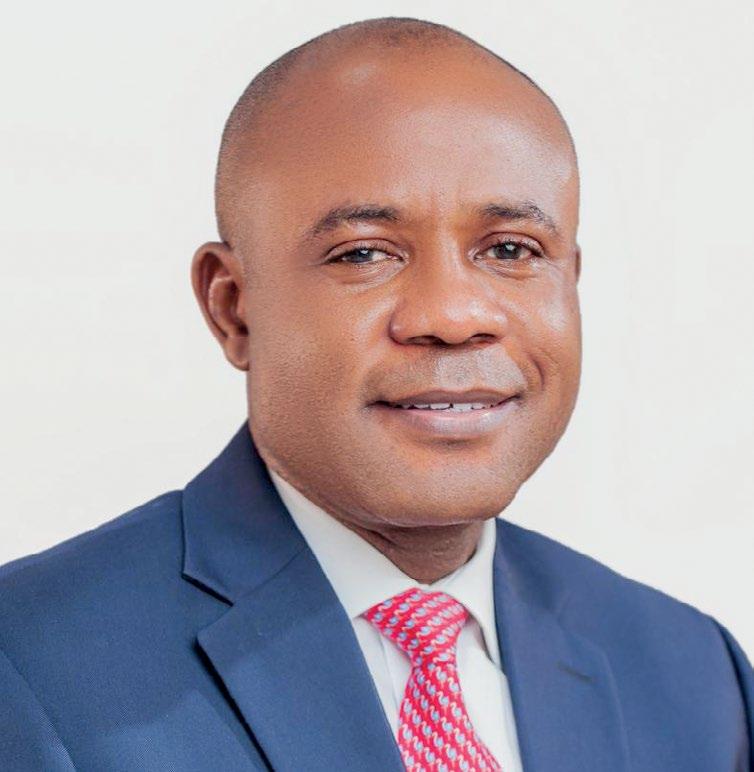

While delivering his inaugural address at Okpara Square, Enugu, the governor said that his administration would start rolling out robust programmes and policies that would transform the state into a modern and industrialised state.
Mbah informed the people of the state that his government would take tough decisions that will be in the best interest of the people and explore every creative opportunity to make the youth the biggest beneficiaries of his administration by engaging them in e-learning, e-commerce, fintech and cyber-security.
He said, “We want to expose our youths to the skills required to grasp the emerging future and create opportunities for the genius in them to flourish. We want to invoke and instill in them the can-do spirit that is innate in the Igbo man.
The new governor who replaced former Governor Ifeanyi Ugwuanyi said his mission to give the metropolis water within 180 days commenced a day earlier, promising to put an end to water scarcity in the city.
The new governor who replaced former Governor Ifeanyi Ugwuanyi said his mission to give the metropolis water within 180 days commenced a day earlier, promising
My administration will meet needs, aspirations of Deltans – Oborevwori

The newly sworn-in Governor of Delta State, Sheriff Oborevwori, has pledged to run an open and responsive government that will meet the needs and aspirations of the people of the state.
Delivering his inaugural address at the Stephen Keshi Stadium, Asaba, Oborevwori said, “I represent consolidation and advancement. Consolidation because I shall continue from where the last government stopped. Advancement because I am advancing Delta State to greater heights, including economic growth, human capital development, infrastructure renewal, peace and security. I am committed to making life richer, better, and more fulfilled for Deltans,” he said.
Oborevwori, who is the former Speaker of the Delta State House of Assembly, added, “Today marks not only the beginning of a new administration, but also an era that will advance Delta State to greater heights in people-centred
policies, human capital development and infrastructure renewal. With what has been achieved by the immediate past administration, the new government is poised to advance the state through the MORE agenda, which stands for ‘meaningful development; opportunities for all; realistic reforms; and enhanced peace and security.
“Consequently, the new administration will seek to foster sustainable economic growth and private sector job creation; boost human capital; build an enabling infrastructure; Enhance governance and accountability systems for improved service delivery; and strengthen public financial management.
“In furtherance of these objectives, the existing entrepreneurship development programmes will be sustained and expanded to encourage the creation of more small-scale businesses, thus creating jobs and, consequently, reducing crime and anti-social activities among our vibrant youth population.
“We will also enhance the existing social investment programmes for the benefit of the poor and vulnerable groups, including widows and people living with disabilities, through microcredit, training, and business networking. We shall further develop empowerment programmes for women’s associations, particularly in rural areas.
We will tackle insecurity – Muftwang
Governor Caleb Muftwang of the Plateau State has promised to tackle insecurity and encourage peaceful co-existence among the people of the state.
Muftwang, who took his oath of office in Jos, Plateau State last Monday, said his administration would be resolute in its desire for a new Plateau and reaffirmed that his government would summon the political will every step of the way to initiate policies and programmes that would engender peace, progress and prosperity in the state.
“Our plans are audacious and our programmes will be transformative, but the smooth execution of these plans

JUNE 4, 2023 THEWILL NEWSPAPER • www.thewillnigeria.com PAGE 10 THEWILLNIGERIA THEWILLNG THEWILLNIGERIA
to put an end to water scarcity in the city
“
Mbah
Oborevwori
...Promise Development

and programmes is predicated on peace. This is because development can only exist where peaceful coexistence thrives. It is an undeniable fact that much blood has been shed on the Plateau for close to two decades now which has affected the pace at which has retarded the pace of our development,” he said.

The new governor, commiserated with the families of those who lost their loved ones over the past years and especially the families in Riyom, Bokkos, Barkin Ladi, Bassa, and more recently, Mangu, where over 100 innocent residents were brutally murdered in their sleep. He said the genocidal attacks of the last couple of years suffered by many communities across the whole state had justifiably left deep wounds and trauma on several widows, orphans, relations and friends.
“This has, in turn, bred hate, mutual suspicion, misplaced anger on innocent passersby and so-called reprisal attacks. Unfortunately, this has opened the door for those who dislike our unity and prosperity to label us as hateful and unaccommodating when indeed, our people are the victims. The time has come, and the Time is now when we must say, enough is enough.
“We must break this vicious circle of hate and attacks and refuse to allow people to brand us negatively. That is not who we are. I make bold to say that no other community of people is as accommodating and welcoming as the people of Plateau. All we ask for is that those who live within the borders of Plateau must agree to live with us in peace and with the utmost respect for our values and traditions.
“This is the new orientation that we must strive to project in the days ahead, which is that everyone who loves Plateau, especially anyone who lives within her borders, is my brother/sister irrespective of tongue or creed. May the Lord Almighty fill our hearts with this understanding and baptise us into this spirit. Amen.”
We will set up bipartisan reconciliation committee – Eno

Pastor Umo Eno, as well as Senator Akon Eyankenyi, were both sworn-in as the fifth democratically elected Governor and Deputy Governor of Akwa Ibom State, respectively, by the State Chief judge, Justice Ekaette Obot.
Speaking shortly after the swearing-in ceremony at the Godswill Akpabio International Stadium, Uyo, Governor Eno lamented that Akwa Ibom had been deeply polarised by politics and promised to set up a bi-partisan reconciliation committee to address contending issues among the people of the state.

Eno said, “I call on our people to come together. Let us build a state where the pain of one Akwaibomite is the pain of all and where the success of one Akwaibomite is the success for all.
“We have been too polarised by politics. This should not be. As I said in my Victory Speech, we will set up a bi-partisan reconciliation committee soon. So we can jaw-jaw instead of war-war on critical issues of our development, unity and brotherhood.”
Therefore he called on the people to support his ARISE agenda to build on the legacies of the immediate past governor, Mr Udom Emmanuel, saying he would be the governor of all Akwa Ibom people, irrespective of their political leanings.
“As we begin this government, we will invite all Akwa Ibomites to arise to the faith of greatness with our ARISE agenda from investment in agriculture, health care services and education; we will ensure that we continue to change the narratives of our state.
“We will continue to support our civil servants and we will ensure that their welfare becomes paramount. We will continue to build on the successes of Deacon Udom Gabriel Emmanuel’s administration,” he said.
I will return 50,000 out-of-school children to classrooms – Makinde

Engr. Seyi Makinde, after taking the oath of office as Governor of Oyo State for a second term, promised to redouble his efforts to complement his past achievements, particularly in the area of provision of qualitative education.
2023 – 2027

The governor announced his plan to return over 50,000 out-of-school children to the classroom through targeted interventions in the next four years.
Makinde said the decision to send the children to school was hinged on the blueprint for the Oyo State Roadmap for Sustainable Development 2023 – 2027, which refocused on four pillars: the Economy, Education, Healthcare and Security.
He said, “Another policy that will remain in place is the 15-20 per cent budgetary allocation to education. We must urgently continue to reduce the infrastructure deficit in our public primary and secondary schools. So we shall focus on building classrooms and other needed facilities in underserved areas in the state".
Makinde said that during his first term in office under Omituntun 1.0, over 50,000 children were returned to the classrooms, through targeted interventions, such as maintaining the no-fees in public schools’ policy, adding that he planned to return another 50,000 to the classroom in the next four years.
”Four years ago, I took an oath before God and you, the good people of Oyo State. I pledged to put aside my selfinterest to serve you to the best of my ability. Today, I stand before you to renew that pledge and reaffirm these solemn words; I will always put your interests first.
”And as we usher in Omituntun 2.0 on this day, I see another opportunity to reflect on our first term in office, recall our promises made and promises kept, and renew those promises you have given us another opportunity to keep”, Makinde said.
I’m prepared, determined with clear vision — Uba Sani
Governor Uba Sani of Kaduna State promised to prioritise security and welfare of the citizens, saying he came prepared and determined with a clear vision to govern the state.
Sani, who made this known in his inaugural speech after he was sworn- in as the governor of Kaduna State, vowed that as governor, he would deploy modern governance tools and technology to tackle poverty and insecurity in the state.
He said, “I am well aware that leadership is not just a job, but a calling. I am very conscious of the fact that as your governor, the safety, security and welfare of the people of Kaduna State shall be the main focus of this administration in collaboration with the incoming members of the Kaduna State House of Assembly.
“My administration shall undertake programmes and policies that will enhance productivity, encourage creativity and harness the rich diversity and cosmopolitan nature of this state. Our programmes and policies shall be people-oriented. I shall run an all-inclusive government that shall leave no one or any part of Kaduna State behind.”
JUNE 4, 2023 THEWILL NEWSPAPER • www.thewillnigeria.com PAGE 11 THEWILLNIGERIA THEWILLNG THEWILLNIGERIA POLITICS
Makinde said the decision to send the children to school was hinged on the blueprint for the Oyo State Roadmap for Sustainable Development
“
Muftwang
Eno
Makinde
Kudos, Knocks as 9th National Assembly Winds up POLITICS
 BY AYO ESAN
BY AYO ESAN
Next week, the curtain will fall on the Ninth National Assembly, which was inaugurated on June 11, 2019. The legislators have already started packing their bags. They are ready to return to their homes, except for a few ones that have returned for another stint of four years and will join the other newly elected legislators for inauguration.
It was gathered however that only 30 percent of the members of the Ninth Assembly will return. A few weeks ago, the President of the Senate, Senator Ahmad Lawan, described the dwindling number of returning lawmakers as disturbing and worrisome.
Lawan said the situation where only about 30 percent of members of the Ninth National Assembly would be going to the 10th Assembly amounted to a loss in capacity, experience, skills and enterprise, among others.
Meanwhile, ahead of the inauguration of the 10th National Assembly, Lawan has set an agenda, saying that capacity building for members of the incoming Assembly should be a priority for efficient and effective service delivery.
According to him, what should be of major concern for the next National Assembly is capacity building for the incoming lawmakers to achieve the set goals and targets. As we expect the inauguration of the new members, the question we need to ask is how the outgoing Assembly fared in the last four years?
It is no news that the 9th National Assembly has been facing several criticisms because of its relationship with the executive, with many political analysts and critics describing it as a rubber stamp.

To this school of thought, the Ninth Assembly failed to carry out the expected check on the executive. One of the examples cited is what has been described as the improper scrutiny of former President Muhammadu Buhari’s appointees, including members of his cabinet, by the assembly.
The Director, Centre for Democracy and Development (CDD), Idayat Hassan said that in Buhari’s firm grip, the outgoing National Assembly became a rubber stamp doing the bidding of the Executive to the detriment of Nigerians. She said the National Assembly did little oversight on Ministries, Departments and Agencies (MDAs), pointing out that, for example, till date Nigerians are yet to receive a feedback on the inquiry into the affairs of the Niger Delta Development Commission (NDDC) since the exercise ended a few years ago.
But Lawan has, however, debunked the public perception of the Ninth National Assembly as a rubber stamp of the executive. He said that for the peace and development of the nation, the three arms of government had to work together as the failure and success of one arm of government would be attributed to all.

He explained that the three arms of government had a responsibility to each other and an obligation to Nigerians and they have a cordial relationship based on mutual respect for constitutional rights and mandate to succeed.
An analysis of this relationship shows that the Ninth Assembly achieved some milestones since it was inaugurated on June 11, 2019.
It would be recalled that after his emergence as the President of the Senate, Lawan had made his direction known, that is, to have a good working relationship with the executive.
Unlike the previous National Assemblies, the relationship between the Ninth Assembly and the executive can be described as cordial and devoid of rancour for sustainable development.
Lawan, in his speech titled: ‘The Senate that works for Nigerians’ had said, “we are going to work collaboratively with the executive arm of government to strengthen our planning and budget linkage that ensures effective service delivery and fulfillment of essential government obligations to the citizens, while taking care of the
perennial delays in our annual appropriation bill passage and implementation.
“I want to seize this opportunity to tell the entire nation, particularly those that are in doubt, that the Senate and indeed the legislature is going to operate independently in accordance with its own rules, procedures and time honoured norms and best practices. While working closely with the executive arm to deliver the dividends of democracy to the Nigerian people.
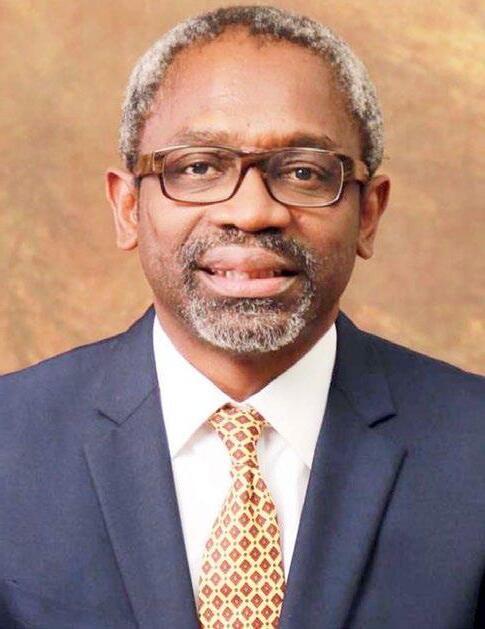
“Our legislative agenda will focus on enacting laws and strengthening existing laws to facilitate the reforms required to truly take our nation, our people and our economy to the next level.
“Within us as a Senate, our leadership will commit to partnership rather than partisanship and between us and the executive arm of Government, we will choose unity of purpose over conflict and discord while also working towards further strengthening and guaranteeing our independence and that of the judiciary.”
Lawan had in the past four years steered the 9th Senate through this part and this has helped to stall any confrontation between the National Assembly and the executive.
First, the Lawan-led 9th Senate had broken the jinx of the budget circle and it also listed several achievements that eluded the 8th National Assembly, because of the frosty relationship with the executive arm of government from June 2015 to June 2019.
In one of his remarks, the Senate president emphasised the achievements of the Senate and by extension, the 9th National Assembly and how the harmonious working relationship with the executive enhanced stability in governance.
He said: “The Ninth Assembly has been the breaker of many legislative jinxes in this Fourth Republic, having recorded breakthroughs in many areas of our national legislative environment that had defied the interventions of previous Assemblies.
“First and foremost, we have enhanced stability in governance through productive cross-party collaboration with the other arms of government, particularly the Executive. This has yielded fruits in the unprecedented number of quality bills passed by the National Assembly and duly signed into law by the President.
“Some of the most critical of such bills that have been signed into law include the Deep Offshore and inland Basin Production Sharing Contract (amendment) Act, 2019, Companies and Allied Matters Act 2020, Nigeria Police Reform Act, 2020, Petroleum Industry Act, 2021, and Electoral Act, 2022, just to mention a few. These are critical legislative interventions relevant to the promotion of good governance in our dear nation.

“For instance, the Electoral Act (amendment) Bill 2022 has rekindled interest in political participation in our country and raised confidence in our electoral process. We passed this Bill early enough and with some innovations to guarantee better conduct of our elections especially beginning from the 2023 elections.
“We were also able to reset our financial years to make our budget cycle stable and predictable. This change has helped immensely in the implementation of projects and programmes, as well as in general performance of the national budgets. This is one legacy of the Ninth National Assembly that we have sustained since 2019, as reflected again, in the passage of the 2023 Appropriation Bill on Wednesday, 28th December, 2022.
Evaluating the implementation of the Senate agenda, Lawan said that “the Ninth National Assembly has been a very active participant in this process of nation building.
“At our inception in 2019, we set out a robust Legislative Agenda to advance our collective aspirations as a nation and make positive impacts in the lives of our people. As a Senate that works for Nigerians. We have remained unwavering in our commitment to the Agenda.”
JUNE 4, 2023 THEWILL NEWSPAPER • www.thewillnigeria.com PAGE 12 THEWILLNIGERIA THEWILLNG THEWILLNIGERIA
“
It is no news that the 9th National Assembly has been facing several criticisms because of its relationship with the executive, with many political analysts and critics describing it as a rubber stamp
Gbajabiamila Lawan
Lagos Lawmakers-elect Adopt Obasa For Speakership
The Ninth session of the Lagos State House of Assembly officially ended on Friday with the returning lawmakers and lawmakers-elect all declaring support for Dr. Mudashiru Obasa as Speaker of the 10th Assembly.

The lawmakers-elect, who were physically present at the sitting, spoke with journalists immediately after the valedictory session of the House presided over by Speaker Obasa. Speaking on behalf of the returning lawmakers, the immediate past Chief Whip of the House, Hon. Mojisola Lasbat Meranda, said Speaker Obasa had no rival.
“I give it to the Rt. Hon. Speaker Obasa for being able to coordinate 40 members of different backgrounds, different thinking and religions and even different tribes because we had Hon. Jude Idimogu,” she said.
On what qualifies the Speaker for a return, Hon. Meranda said: “Obasa is the best man for the job. The experience, capacity and leadership skills are there and I don’t see anybody matching up to him.
“He will be returning as a sixth timer and I don’t think any of us is on the same pedestal with him. I wish him all the best in the 10th Assembly because he is going to lead us again. He is a fantastic man.”
Also addressing journalists, Hon. Mojeed Fatai, immediate past chairman of the Committee on Public Accounts (local), said the leadership of the ninth Assembly ensured a cordial relationship among members. “Mudashiru Obasa is going to speak again in the 10th Assembly. He is a man we have all resolved to lead us. When we started four years ago, all of us were elected from the APC and it was because of his effort and the way he handled the House.
“Today, we have 38 members from the APC coming to the 10th Assembly.
Oyo Guber: Tribunal Dismisses Petition Against Makinde's Re-Election
STORIES BY AYO ESAN
The Governorship Election Petition Tribunal sitting in Ibadan, the Oyo State capital, on Friday dismissed the petition filed by the Action Alliance’s (AA) candidate in the March 18, 2023 election, Mr. Babatunde Ajala, against Governor Seyi Makinde’s victory.
The three-man tribunal, led by Justice Ejiro Emudainohwu, in a unanimous ruling dismissed the petition and awarded a cost of N600, 000 against him.
The tribunal awarded a cost of N100, 000 in favour of INEC, and N250, 000 each in favour of Governor Makinde and the Peoples Democratic Party (PDP).
Edo Youths Host Obaseki June 12
The success is because of Obasa’s leadership capability. He is the best for the House and we want him to continue,” he said.
On his part, Hon. Temitope Adewale (Ifako Ijaiye Constituency 1), described Obasa as a leader who had made a tremendous impact on the members.
“Under Obasa, the executive and legislative arms of government have enjoyed a fantastic relationship and that is why you have developmental growth across the State today. You can also see the bills passed into law.
“With Mr. Speaker coming back and with our governor back, they will give Lagosians the desired development that they yearn for particularly considering the fact that we now have a President who is from here,” Adewale said.
Speaking on behalf of the 20 first-term lawmakers-elect, Oladipo Olayinka Ajomale, who will represent Oshodi Isolo 2 at the 10th Assembly, said he and his colleagues have resolved to support Obasa as Speaker of the 10th Assembly.
“I can assure you that the 20 of us who are new are fully in support of Speaker Obasa for the 10th Assembly because we have learnt and understudied and we know that this is a man who has proven himself over and over again to be the best man for the job.
“Logically thinking about it, he is the most experienced in the House. So it doesn’t make sense for anyone to come and do trial by error. I stand with him fully and all of us who are new also support the Speaker to speak for us at the 10th Assembly,” he said. Earlier, the Speaker had commended the ninth Assembly lawmakers for their support which led to the passing of 46 bills, over 120 resolutions and a couple of regulations.
He also presented certificates of meritorious service to the members.
Youths from the 18 Local Government Areas of Edo State will, on Monday, June 12, 2023, play host to the State Governor, Mr. Godwin Obaseki, during the inauguration of the new executives of the Edo State chapter of the National Youth Council of Nigeria (NYCN).
The inauguration is scheduled to take place at the Edo NYCN Secretariat, Akpakpava, Benin City, by 9 am prompt.


Speaking to journalists, Deputy Chairman, Edo NYCN, Johnson Matthew Ogbogho, said the inauguration which ushers in the new leadership of the youth's body, will serve as an opportunity for the state governor to meet with youths in the State.
According to him, “The new leadership of the Edo State National Youth Council of Nigeria (NYCN) will be inaugurated on Monday, June 12, 2023, at the Council’s Secretariat in Benin City by 9 am. As part of events for the inauguration, Edo youths will be hosting the State Governor, Mr. Godwin Obaseki, bringing together youths from the 18 local government areas of the State under the same roof with their performing governor and chief executive.

“Edo youths are proud to be hosting Governor Obaseki who has recorded a milestone in promoting youth participation in governance and created several opportunities for young people to realize their fullest potential through the Edo jobs initiative and other programmes. As the body that has been entrusted with the responsibility of championing the interests and welfare of the youth within the state, we understand the need to sustain a constant interface between the government and youths to sustain the gains recorded in youths' development and address the challenges facing young people in the State. These are some of the reasons for organising the event.”
Reassuring the commitment of the new executives to pursue programmes to ensure inclusivity and better opportunities for youths in the State, Ogbogho noted, “We will continue to work tirelessly, in partnership with the government to foster unity, promote youth empowerment initiatives, and advocate for the socio-economic progress of our vibrant and dynamic youth community.”
In the petition, INEC was the first respondent, while Governor Seyi Makinde was the second respondent. The PDP was the third respondent.
A Senior Advocate of Nigeria (SAN), Otunba Kunle Kalejaye, represented Governor Makinde, while Mr. Isiaka Olagunju (SAN) was the counsel for PDP.
Counsel to AA and its candidate, Etibo Orowo King, had informed the tribunal that the party and its candidate had decided to discontinue the case. He then urged the tribunal to strike out the case in the interest of the state.
He said, “My prayer is for the cancellation of the result of the election. But, on further reevaluation, we decided to discontinue the case in the interest of peace and tranquility.”
But Counsel to the governor urged the tribunal to dismiss the case.
He said, “The petitioner asked that the case be struck out. We want the case to be dismissed. It is a petition that is dead on arrival.”
The PDP counsel aligned himself with the position of Otunba Kalejaiye. The tribunal subsequently dismissed the petition. Speaking with journalists after the judgment, Kalejaiye said: "It was the final end of the petition brought by Action Alliance against the emergence of Governor Seyi Makinde in the March 18 election. The petition was essentially to ask for a rerun of the election on the basis that the candidate that was cleared for the election was not the candidate that was filled by the party. The petition was filed, and we responded to it, only for us to come this morning and find out that the party and the candidates claimed that they had looked at the petition again and they were not sure that they would succeed and they brought an application to withdraw the petition.
“We are convinced that it was when they saw our response to the petition that they made up their minds on the un-viability of the petition because we attached 18 grounds to our response and that culminated into what happened today. The tribunal has dismissed the petition and has awarded cost against Action Alliance (AA).
"But there is one thing that is very clear which I made known to the tribunal. Candidates and political parties who performed abysmally in an election should not be allowed to come to court to waste judicial time. Where a political party only scored 387 votes and challenged a person who scored 563, 617 votes in all the 33 local governments is a waste of judicial time.
JUNE 4, 2023 THEWILL NEWSPAPER • www.thewillnigeria.com PAGE 13 THEWILLNIGERIA THEWILLNG THEWILLNIGERIA
POLITICS NEWS
From left, Dr Saka Balogun; former Chairman, Oyo State Advisory Committee, Senator Hosea Agboola; Dr Duro Ogunesan; former deputy governor of Oyo State and PDP National Deputy Chairman, (South), Hon. Taofeek Arapaja and chairman of the meeting, Prof. Duro Adeleke, during a town hall meeting towards repositioning of the Oyo State Park Management System (PMS) held at House of Chiefs, Secretariat, Ibadan.
Fuel Subsidy Removal Has Come to Stay N
ewly-sworn in Nigerian President, Bola Ahmed Tinubu, had thrown caution to the winds on Monday, 29 May 2023, with his ''fuel subsidy is gone'' declaration during his inauguration speech. But the response that came from most Nigerians was quite unexpected.
Rather than an applause for having the guts to take the bold decision that his predecessors could not summon the courage to take for many years, as the country continued to bleed, what followed Tinubu's declaration was shock, surprise and even condemnation in some quarters as the country was almost shutting down, embarrassingly, right from his first day in office.
The reality of that ''infamous'' declaration, however, dawned on all Nigerians two days after with the announcement of a new fuel price regime by the Nigeria National Petroleum Company Limited, NNPCL, and it clearly passed the message that, indeed, the era of the controversial and fraudulent fuel subsidy is finally over.
While some unofficial public parole of the government tried to steal the show by explaining the rationale for the decision as the President was yet to announce the appointment of any of his personal aides, the Managing Director of NNPCL, Mele Kyari, had no choice than to take up the challenge to explain to Nigerians that
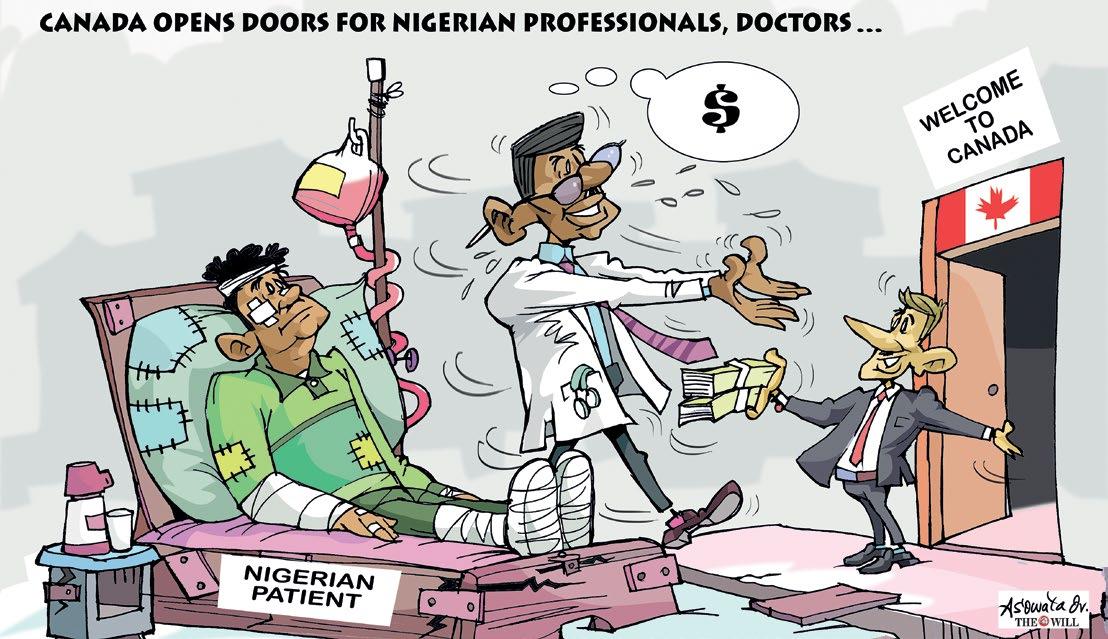
Publisher/Editor-in-Chief Austyn Ogannah
Editor – Olaolu Olusina
Deputy Editor – Amos Esele

Politics Editor – Ayo Esan

Business Editor – Sam Diala
Copy Editor – Chux Ohai
Cartoon Editor – Victor Asowata
Entertainment/Society Editor – Ivory Ukonu
Photo Editor – Peace Udugba

Head, Graphics – Tosin Yusuph
Circulation Manager – Victor Nwokoh
Nigeria Bureau: 36AA Remi Fani-Kayode Street, GRA, Ikeja. Lagos, Nigeria. info@thewillnigeria.com / @ THEWILLNG, +234 810 345 2286, +234 913 333 3888.
EDITOR: Olaolu Olusina @OLUSINA
[Letters/Opinions: opinion.letters@thewillnigeria.com]
the time to face the new reality is now.
He even went further to inform Nigerians that the NNPCL had been funding the subsidy regime with a whopping N400 billion monthly as support to the Federal Government, stressing that the government was still owing his company N2.8 trillion as it provided the government with N6 trillion in 2022 and another N3.7 trillion in 2023 for the subsidy payment.
Although it is a painful decision to make at this point in time in our national trajectory, we want to commend President Tinubu for having the courage to do this now given the implications on his new administration that is still warming itself into the hearts of Nigerians. While acknowledging the initial pains and multiplier effects on every aspect of life of the average Nigerian, we must all note that there cannot be any gain without pain as we urge everyone to see this as the price to pay to realise the Nigeria of our dreams.
We also commend the Federal Government for consolidating its position in pushing the new policy through with the scrapping of the Petroleum Equalisation Fund (PEF), as well as the national transport allowance for oil marketers by the Nigerian Midstream and Downstream Petroleum Regulatory Authority (NMDPRA) .
We implore the government to effectively monitor the new policy to ensure that Nigerians are not unnecessarily exploited by unscrupulous oil sharks
who might want to abuse the liberalisation of the market. We also urge the government to listen carefully to every concern being raised as it continues with the implementation of the new
fuel price regime and handle the negotiations with labour with every sincerity. The much-promised palliatives must not be delayed and must be distributed evenly under strict monitoring to avoid a repeat of the experience with the COVID-19 palliatives that were cornered and hijacked by officials of the immediate past administration.
We also call on the Federal Government to beam a searchlight on some indirect subsidies being given to the rich, business and political elite at the expense of the poor Nigerians if government is really sincere about its intentions of putting a stop to subsiding the rich - a reason given by the NNPCL boss for the government’s decision to stop fuel subsidy.
Some of these indirect subsidies include duty waivers worth N16 trillion that had been given to businesses with nothing to show for it; N13 trillion given to electricity companies that are supposed to be privately run and the N5.4 trillion loan owed by over 380 debtors to banks that are being managed by the Asset Management Corporation of Nigeria, AMCON, since 2015. We have no doubt about the genuine intention of the Tinubu Administration to turn Nigeria around for good and restore the glory of the country. While acknowledging that this is a very daunting task, we believe that this is not impossible if the government shows sincerity of purpose in all its policies and this would be complemented by full cooperation and support of all Nigerians.
JUNE 4, 2023 THEWILL NEWSPAPER • www.thewillnigeria.com PAGE 14 THEWILLNIGERIA THEWILLNG THEWILLNIGERIA
Although it is a painful decision to make at this point in time in our national trajectory, we want to commend President Tinubu for having the courage to do this now given the implications on his new administration that is still warming itself into the hearts of Nigerians. While acknowledging the initial pains and multiplier effects on every aspect of life of the average Nigerian, we must all note that there cannot be any gain without pain as we urge everyone to see this as the price to pay to realise the Nigeria of our dreams
EDITORIAL
FG’s Social Protection Programmes: Conduit For Corruption
BY ILERIOLUWA OLADIPUPO
All over the world, social safety nets are tools used by governments to help the vulnerable people in society to tackle hunger and poverty.
In Nigeria, successive governments have expressed concern about the high level of poverty in the country, despite being endowed with enormous resources.
Programmes such as Operation Feed the Nation, Green Revolution otherwise known as “Back to Land”, Directorate for Food, Roads and Infrastructure, Directorate of Employment, Better Life Programme, Peoples Bank Project…
Family Support Programme, National Economic Empowerment and Development Strategy, SURE-P and National Poverty Eradication Programme have been initiated at different times to tackle the high level of poverty in the country.
However, it appears as if safety nets in Nigeria have holes. Many have described them as handouts that cannot scratch the surface of the poverty levels in the country.
In 2016, the Muhammadu Buhari Administration set up the National Social Investment Programme (NSIP) as its measure to combat poverty and hunger across the country. The components of the administration’s SIP include the N-Power Programme, the National HomeGrown School Feeding Programme (NHGSFP)…
The Conditional Cash Transfer (CCT) Programme and the Government Enterprise and Empowerment Programme (GEEP), which consists of the MarketMoni, FarmerMoni and TraderMoni schemes.
Howbeit, the programmes have been fraught with challenges, such as corruption, shortsightedness, design error, inconsistency, paucity of funds and lack of accountability, to mention a few.
As someone who has benefitted from the N-Power Program, for instance, it will be wrong to say there is no impact altogether, but the impact in the society is not commensurate with the sums of money the government
claimed to be spending on the different programmes.
The government claimed to be spending N500 billion yearly on ‘social investment programmes’, yet a 2022 report by the National Bureau of Statistics (NBS) showed that some 133 million Nigerians (62.9 per cent of the population) are poor.
That is so much for a government that claimed to be working towards lifting 100 million people out of poverty.
Let me talk about the N-Power Programme a bit.
As plausible as the programme appears, it has a poor design. It was meant to address the issues of youth unemployment and help increase social development.
At its inception in June 2016, graduates who applied and were successful were employed in the different categories of N-teach, N-health, N-agro and N-build.
They were employed for two years and given a monthly stipend of N30,000. One would think the youths would be empowered as the programme is named, but only beneficiaries under the first N-agro batch were trained before they started work.
The beneficiaries would later be rolled back to the streets with nothing to fall back on. How did the government hope to tackle unemployment this way? The result of this shortsightedness is obvious.
Unemployment figures have been on the steady rise. It was 10.4 per cent at the end of 2015 before the ‘life-saving’ programme but today, KPMG has projected that Nigeria’s unemployment rate is expected to rise to 40.6 per cent as compared to 2022’s 37.7 per cent.
The Federal Government was committed to paying the monthly stipends as beneficiaries under the first two batches can testify, but the monthly payment became haphazard the moment the programme was moved in 2019…
From the office of the Vice President to the newly created Ministry of Humanitarian Affairs, Disaster Management and Social Development, stipends could go unpaid for as
long as three months, thus demoralising the beneficiaries. There was hardly any form of supervision from government officials.
Independent monitors who supervised the programme under the Vice President were replaced when it was moved to a new ministry.
Take a look at the Vice President’s Tradermoni. How much of these interest-free loans were recovered? According to Farouk Sadiya, the Federal Government was yet to recover N10 billion Tradermoni loan three years after.
The programme was introduced with so much fanfare and it looked like an answer to people’s needs. But in reality, how much impact can N10,000 have on a small business with the rising inflation?
Little wonder many of the traders saw the programme as a one-time, cash-out scheme. Well, blame it on the timing of the disbursement of the loans and you may not be wrong. The programme was initiated in 2018 during the Presidential campaign, and it looked more like an electioneering tool. A similar incident happened during the just concluded election season.
Some of the beneficiaries of the concluded N-Power batch (Batch C stream 1) got stipends for three straight months. For context, this batch had concluded their programme since August 2022.
They had been paid for a year already, but some of them received credit alerts between February and March 2023. It was tagged “an act of minister’s generosity.” Such generosity comes during pelections to a few ‘lucky’ individuals.
Feel free to make your conclusions but it is clear that some of these social investment programs are money-making tools by those who have access to government coffers.
•Oladipupo
•Continues online at www.thewillnigeria.com
10th National Assembly: Nigeria’s Last Chance
BY MON-CHARLES EGBO
In a few days, the presiding officers of the 10th National Assembly will be elected. This event, typical of every contest, will throw up two categories of people: those who are pleased with the outcome and the ones who feel otherwise.
Understandably, the wishes of the members of both chambers of the incoming Assembly are driven by interests, although it cannot be immediately established whether they are about the country or individuals. But in the belief that it is about nationalism, then head or tail, it is a win-win for Nigeria. This is because logically, lawmakers in the Red and Green chambers mean well for the nation only that their perceptions differ.
Again, while spirited attempts, largely motivated by multidimensional sentiments, are made to externally influence the choices of the legislators-elect, the decision as to who will become their presiding officers begins and ends with them. Whether by consensus or merit, they are the ones that make the choices in the final analysis. It is within their exclusive rights and priviledges and also, the election is a process that has strict conventions. So the outcome, like the two sides of a coin, coincides or is at variance with the wishes of the outsiders, once again, depending on whether their interests are broad or narrow.
Therefore as the 10th National Assembly comes on stream, the basic public expectation is a sustainable dispensation of good governance delivered by a legislature that is peopleoriented and under a leadership that is defined by dexterity, creativity and absolute loyalty to the people. For emphasis, Nigerians today deserve a responsive parliament driven by a deliberate commitment to regular citizens’ engagement.
Granted, these aspirations are as non-negotiable as they are core dividends of democracy. Yet, they are not automatic. They can only happen with the active involvement of a vigilant citizenry as researches show that strong democracies the


world over are characterised by robust citizen participation. In other words, there can never be effective leadership without effective followership. This is the reason every wellmeaning Nigerian should urgently pause and ponder on the prevailing sorry state of the country.
This is imperative because except for ignorance or mischief, it is glaring that we cannot hand over to our children, the same country that we inherited from our fathers. The signs are there, yet we seem indifferent. Are we not alarmed by the grim prospects of losing things and persons very dear to us, including innocent children, if Nigeria fails?
What about the mental agony of losing personal liberties and becoming captives in our own land, irrespective of status? Are the masses not yet seeing the damning consequences of their age-long prejudice and hostility towards the national assembly? Are we not yet persuaded that certain things should either not have happened in the first place or should have happened differently if only we were actively involved in the goings-on in the national assembly since 1999? Could we have been this mercilessly impoverished and short-changed sequel to leadership deficit? Truly, every heart should bleed over Nigeria’s precarious situation because when it rains, no roof is spared.
However, there is good news. There is a ray of hope. A new beginning is possible. Nigeria can still work. But once again, it is a function of our actions now. Yes, our future is in our hands. Before us right now is an opportunity, possibly the last, to act, lest Nigeria slides into absolute failure.
So, if what informs our concerns and interests regarding the choice of the presiding officers are really borne out of patriotic and nationalistic ideals, despite the eventual outcomes, then we are morally liable for the success or failure of the 10th national assembly. Yes, what it becomes depends on what we do or fail to do now.
Hence if we wish not to bungle this last chance, then we
should right away stand up and be counted. We must embrace this 10th national assembly as truly our own. We should seek to be fully abreast of its scheme of things. We have to accord it all the necessary support and cooperation for it to excel. It is no longer about short-term benefits but about what unites us and aids our journey to nationhood. Everyone should immediately remove the toga of ethnicity, religion and partisanship and think Nigeria first. The media, civil society organisations, professional bodies, labour unions, youth, women and community-based groups, the political class, as well as the clergy, should put on garments of activism in championing a legislature that derives its legitimacy and relevance from the people. Every mouth should loudly speak against bad governance whenever and wherever it occurs.
With an open mind, we should pay attention to how the legislature supervises the other arms, especially the executive. Specifically, we should demand explanations from the 10th National Assembly as to why the country’s refineries are not operational and what they hope to achieve in the face of Nigeria’s dire situations, particularly the raging petroleum subsidy questions, poverty index, youth unemployment, insecurity, rising debt profile, health, education and power sectors, budget performance, federal character principle and then, why the federal executive council is awarding contracts without the public procurement council in place.
We should clamour for legislative agenda with timelines and whose deliverables can translate to tangibles in the immediate, instead of high-sounding achievements that would exist only on paper and make no meaningful impacts in the lives of the people in the long run.
• Egbo is a public relations practitioner and can be reached at moncharles@yahoo.com
*Continues online at www. thewillnews.com

JUNE 4, 2023 THEWILL NEWSPAPER • www.thewillnigeria.com PAGE 15 THEWILLNIGERIA THEWILLNG THEWILLNIGERIA OPINION
is an analyst at SBM Intelligence
Nigeria Air: Tragedy of N85bn Rot Buhari Left Behind
BY SAM DIALA
Former President Muhammadu Buhari left office on May 29, 2023, after eight years in office, without establishing the national carrier, which he had promised when he was first sworn-in in 2015. However, over N85 billion was blown on the ‘phony’ project supervised by the Minister of Aviation, Alhaji Hadi Sirika.
From the outset, Sirika pursued the project in a manner that suggested his priority for a personal carrier over a national carrier. He committed humongous public resources to the Nigeria Air project in the most unconscionable manner from the outset.
The Take-off
The project was greeted with outcries over the outsourcing of the Nigeria Air logo to a Bahraini company by the Federal Government at an allegedly outrageous sum, despite the abundance of similar service providers in the country.
There were claims that the contract was worth $600,000 (N183 million), which the government denied without providing evidence. Coupled with the huge expenses incurred in freighting a large contingent of government officials and other Nigerians to the Fanborough Fair in UK in 2018 for a mere unveiling of the National Carrier, it was obvious that the project was billed to thrive more on controversy than in reality.
Broken wings manifest
Incidentally, the proposed airline, which was expected to gulp $8.8 million preliminary cost and $300 million as takeoff cost,
had to be suspended before the December 2018 take-off date, following the discovery that no budgetary provision had been made for the venture.



Minister of Information and Culture, Lai Mohammed, revealed that investors who were supposed to partner with the Federal Government on the project eventually backed out, a claim Sirika denied.
“Among the reasons being bandied around for its (Nigeria Air) suspension, especially in the social media, is the absence of interested and ready investors. This couldn’t be farther from the truth, as the national carrier project has an avalanche of wellgrounded and ready investors”, Sirika said in a statement issued on his behalf by James/// Odaudu, deputy director, media and public affairs, ministry of transportation.
The anomaly that Sirika was pursuing the Nigeria Air agenda, without a concrete government plan, expectedly launched the project on the inevitable ‘Uncertainty Expressway’ where it sojourned before the inglorious unveiling of ‘Nigeria Air’ on May 26, 72 hours to Buhari’s exit.
Idea in the sky
But a huge chunk of taxpayers’ money had been invested in Air Nigeria, a project that has remained an idea in the sky.
President of Aviation Round Table (ART), Elder Gabriel Olowo, in January 2019 criticised the Federal Government for earmarking N8.5 billion for the suspended national carrier, Nigeria Air, in
Continues on page 33
MORE INSIDE
racka, BudgIT’s service delivery promotion platform, which allows citizens to collaborate, track and give feedback on public projects in their communities, has discovered that a total of N81.7 billion was allocated to
Zenith Bank Eyes Robust H2 After ‘Best Corporate Governance Financial Services’ Award
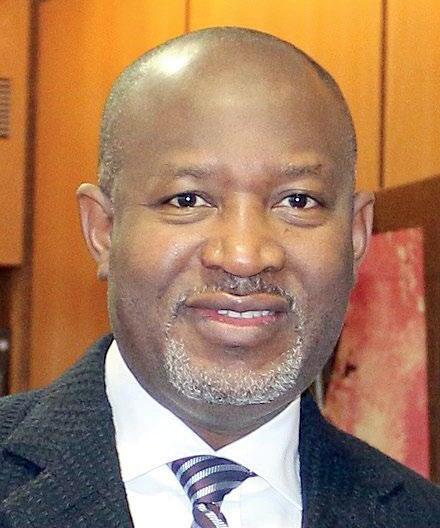
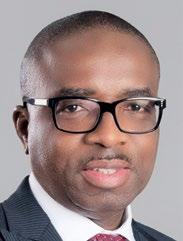
the construction of solar street lights in the 2023 FG Capital and Constituency projects.
FG Allocates N81.7bn For Streetlights – Higher Than Total Budget For Schools, PHCs Combined – Report T
This is higher than the total allocation to schools and primary health centers, which

Continues on page 33
34
FBN
35
Zenith Bank Plc is set for another stellar performance as it enters the second quarter that would usher in the H1 performance results. This is coming on the heels of wining the ‘Best Corporate Governance Financial Services’ Africa 2023 award by the Ethical Boardroom.
Continues on page 34
JUNE 4, 2023 THEWILL NEWSPAPER • www.thewillnigeria.com PAGE 32 THEWILLNIGERIA THEWILLNG THEWILLNIGERIA JUNE 4, 2023 • THEWILL NEWSPAPER • www.thewillnigeria.com VOL.3 NO.24
PAGE
PAGE
CBN Debunks Devaluation of Naira Report
Holdings Records N805.2bn in Revenue Surge as Assets Climb 18.5%
Onyeagwu
Sirika
PUBLIC FINANCE/AVIATION


FG Allocates N81.7bn For Streetlights – Higher Than Total Budget For Schools, PHCs Combined – Report
Continued from page 32
Institute of Oceanography and Marine Research was assigned N1.2 billion across four projects to supply medical equipment to health centers in Ogun State, and N580 million was allocated to National Root Crops Research Institute, Umudike, to construct roads and streetlights in Abia State, amongst many others.
The Acting Head of Tracka, Ayomide Ladipo, expressed her displeasure over this development.
“The implications of assigning projects to agencies out of their mandate is that it undermines monitoring, evaluation, and the sustainability of these projects. These agencies lack the expertise and personnel to ensure quality service delivery of these projects, leading to projects under-delivery and a colossal waste of taxpayers’ money and scarce resources.
An example is the News Agency of Nigeria which was allocated N200 million to construct solar streetlights in Rivers State. What business does NAN have with streetlights?” Ayomide said.
Tracka discovered a 21% reduction in the percentage of empowerment projects this year compared to last year, where N58 billion of N100 billion was allocated to empowerment projects in 2022, while N37 billion of N100 billion was allocated to empowerment projects in 2023.
This is progress as it is the first time in three years that the percentage of empowerment projects in the ZIP will be less than 50%.
Nigeria Air: Tragedy of N85bn Rot Buhari Left Behind
Continued from page 32
the 2019 budget proposal to the National Assembly. He also took a swipe at the government for setting aside the sum of N500 million for Transaction Advisers in the budget.
Olowo observed that a little of such an amount of money, if allocated to technical professionals in the country, would give the government appropriate advice on how to go about the floating of a befitting national carrier for Nigerians.
Data by the National Bureau of Statistics and compilation of budgetary allocations showed that the government spent N85.42 billion on transaction advisers, working capital and consultancy bills for Nigeria Air between 2016 and 2023.
In April 2023, Sirika was under fire for spending a whopping sum of N12 billion to acquire 10 firefighting trucks in Nigeria Airports. The minister had disclosed that he commissioned 10 firefighting trucks for the Federal Airports Authority, FAAN, in the guise that FAAN had not bought firefighting trucks in 15 years.
“
between 2016
Indigenous players act
gulp N77.9 billion and N3.1 billion, respectively, in the budget. In 2022, a UNESCO report tagged Nigeria’s out-of-school children figures at 20 million, a staggering 52% increase from the 10.5 million reported by UNICEF in 2020. Nigeria’s child mortality rate is the secondhighest in the world, and maternal mortality is at 576 per 100,000 live births, the fourthhighest in the world.
In a country plagued with these critical issues, dwindling revenue, and a failing economy, the bogus allocation to streetlights is a gross misplacement of priority. Nigeria is also presently littered with non-functional and vandalized streetlights that have stopped working less than two years after their construction.
Our analysis also discovered that over 687 projects worth N112 billion were allocated to agencies outside their mandate. The Nigerian Army was allocated N4.5 billion for the Construction of Dengi-Kwalmiya-GagdiWawus Bauchi Road in Plateau State, Nigerian
We strongly advise against empowerment projects being a large chunk of ZIPs as they are mostly vague and challenging to track. These empowerment projects have also been used as a funnel to transfer political benefits to party loyalists.
In the 2022 budget expenditure, from www. govspend.ng, we uncovered N10 billion in payments made to 18 personal accounts for vague services. Amongst them, the Office Of The Special Adviser to the President on Niger Delta directly paid a total of N4 billion to two personal accounts—N2 billion to one Dasimaka Adokiye Sami across 12 transactions mostly tagged ‘Being payment of bulk stipends to the 2,802 ex-agitators of ateke tom camp in phase 1 as approved by the ia’ and another N2 Million was paid to Ebikabowei Victor Ben across 27 transactions mostly tagged ‘Being bulk payment to the 500 delegates of boyloaf camp 2 phase 2 as approved by the ia.’

These payments are a clear violation of section 713 of the Public Sector Financial Regulations, 2009, which reads as follows:
“Personal money shall in no circumstances be paid into a government bank account, nor shall any public money be paid into a private bank account. An officer who pays public money into a private account is deemed to have done so with fraudulent intention.”

As the aforementioned provision states, by this action, a prima facie allegation of fraudulent intention exists.
Tracka calls on Nigerians to question and probe these anomalies in the 2022 and 2023 budget expenditures. We also call on elected representatives to duly perform oversight functions, provide timely updates to the public, carry citizens along, and ensure the quality implementation of the projects they nominated so that citizens can derive maximum benefits from public funds.
According to then presidential candidate of the African Action Congress and an activist, Omoyole Sowore, the aviation minister and President Muhammadu Buhari had finished Nigeria.
In his tweet, Omoyole said: “Wow! You mean you bought a single fire engine for over $2 million each. Wonders shall never cease. You and @mbuhari really finished Nigeria!”
Desperation unlimited
In April 2022, former Virgin Nigeria Airways boss, Captain Dapo Olumide, was named as the interim managing director of Nigeria Air with plans to float the new airline with Qatar Airways as a major stakeholder. The Nigeria/ Qatar arrangement failed.
On June 6, 2022, the Nigerian Civil Aviation Authority (NCAA) presented Nigeria Air with its Air Transport Licence (ATL) in a development that will make the airline a legal entity.
The ATL is one of the licences received by airlines before they can commence operations as they await the all-important Air Operator Certificate (AOC) that fully guarantees them the right to begin air services. Regrettably, NCAA declined to grant an AOC to Nigeria Air.
As Buhari’s tenure-end approached, Sirika intensified the effort to make his dream of Nigeria Air a reality before leaving office. The opaqueness in the deal with Ethiopian Airlines has been condemned by experts and stakeholders.
Sensing a serious threat to Nigeria’s aviation industry, the Airline Operators of Nigeria (AON) went to court to secure an order to stop the Air Nigeria/Ethiopia Airline deal. But the move did not prevent Sirika from flying ahead.
In a press statement, entitled “Nigeria Air: Recent So-called Flight Inauguration and AON Concern”, signed by the group’s spokesperson, Prof Obiora Okwonkwo, the AON condemned the desperation in Sirika’s blood to inaugurate an illconceived airline that had not been licensed to commence air operation.
“Nigeria Air has not been issued with an Air Operators Certificate (AOC) by the Nigeria Civil Aviation Authority (NCAA), which is the legal authority for the issuance of such certificate and as such, cannot conduct flight operations,” AOC said in a statement seen by THEWILL.
“As indigenous operators, we are happy and grateful to the NCAA for saving us from this punishment by resisting the pressure from Minister Hadi Sirika to grant an AOC to Nigeria Air without going through the due process.
“The Ministerial Committee on the Establishment of a National Carrier recommended the establishment of a National Carrier that is private sectordriven with minimum government involvement.
“That was jettisoned by the minister who is the person doing everything from designing the logo, unveiling it at the Farnborough Air Show in the UK, establishing the company, providing offices etc, while the socalled private investors are saying and doing nothing,” AON stated.
However, Sirika, said that the Federal Government was going ahead with establishing a national carrier, despite the subsisting suit challenging the project.
During a stakeholders’ appreciation forum for the reconstruction of Lagos airport runway 18L, Sirika insisted that aviation stakeholders and unions had sufficient time to participate in the process and “cannot stall the project with legal suits”.
He said he did not see the possibility that any court of competent jurisdiction will erect a roadblock to the emergence of the national carrier.
JUNE 4, 2023 THEWILL NEWSPAPER • www.thewillnigeria.com PAGE 33 THEWILLNIGERIA THEWILLNG THEWILLNIGERIA
In a country plagued with these critical issues, dwindling revenue, and a failing economy, the bogus allocation to streetlights is a gross misplacement of priority
“
Data by the National Bureau of Statistics and compilation of budgetary allocations showed that the federal government spent N85.42 billion on transaction advisers, working capital and consultancy bills for Nigeria Air
and 2023
*Continues online at www. thewillnews.com
Zenith Bank Eyes Robust H2 After ‘Best Corporate Governance Financial Services’ Award
The award, which was published in the Spring 2023 edition of The Ethical Boardroom magazine, was in recognition of the bank’s adherence to global best practices and institutionalization of corporate governance, setting an industry-wide example of best practices in that field.
Zenith Bank announced impressive performance in its unaudited results for the first quarter ending 31st March 2023. It recorded an exceptional doubledigit growth of 41% in Gross Earnings, increasing from N191.5 billion in Q1 2022 to N270 billion in Q1 2023.
The unaudited financial statement indicated that the significant double-digit growth in the topline also boosted the bottom line, with the Group experiencing an impressive 27% year-on-year (YoY) increase in Profit Before Tax (PBT), rising from N68 billion in Q1 2022 to N86.6 billion in Q1 2023. Profit After Tax (PAT) also grew by 13% from N58.2 billion to N66 billion during the same period.
The growth in the topline was propelled by substantial increases in both interest income and noninterest income. Interest income surged by 52% from N126.4 billion in Q1 2022 to N191.6 billion in Q1 2023, while non-interest income expanded by 27% from N57.2 billion to N72.8 billion.
Speaking on the ‘Best Corporate Governance Financial Services’ award/ the Group Managing Director/Chief Executive of Zenith Bank Plc, Dr. Ebenezer Onyeagwu,
How Capital Market Will Aid Nigeria’s Infrastructural Development – SEC DG
The Securities and Exchange Commission (SEC) has said that the Nigerian capital market will aid infrastructural development in the country. This disclosure was made by the Director General of SEC, Lamido Yuguda, on Thursday.
Mr Yuguda expressed the belief that the Nigerian Capital Market, being an organised and specialised financial market that drives capital mobilisation through domestic savings and foreign capital inflows, is well positioned for the realisation of the infrastructure objectives of the nation. According to him, the benefits of adequate infrastructure in any economy cannot be over-emphasised as they help to speed up development and create wealth.
said: “I am extremely pleased that Zenith Bank has been awarded the Ethical Boardroom Corporate Governance award as a regional governance champion for the fourth year running. No doubt, the bank’s board has pioneered the exemplary governance culture for which we are now renowned.
“Indeed, this recognition reflects our steadfast commitment, discipline and high ethos in the conduct of our business and dedication to the principles of good corporate governance. This award will motivate us to strengthen this culture internally and advocate for good governance at every forum”.
Ethical Boardroom is a trailblazing and leading international magazine that delivers in-depth coverage and critically-astute analysis of global corporate governance issues to help boards stay ahead of the governance curve.
Zenith Bank has been generally adjudged a Corporate Governance compliant bank by the Nigerian Exchange (NGX) hence its listing on the Premium Board of the Exchange..

The bank’s track record of excellent performances has continued to earn it numerous awards including being recognised as the Number One Bank in Nigeria by Tier-1 Capital, for the 13th consecutive year, in the 2022 Top 1000 World Banks Ranking published by The Banker Magazine; Bank of the Year (Nigeria) in The Banker’s Bank of the Year awards 2020 and 2022.
CBN Debunks Devaluation of Naira Report
The Central Bank of Nigeria (CBN) has denied devaluing the naira contrary to a report in a national newspaper.
Dr Isa AbdulMumin, Ag. Director, Corporate Communications of the CBN in a statement issued Thursday described the publication as false and destabilising innuendos, reflecting potentially willful ignorance of the said medium as to the workings of the Nigerian Foreign Exchange Market.
The statement reads in part: “The attention of the Central Bank of Nigeria (CBN) has been drawn to a report by a national newspaper of June 1, 2023, titled ‘CBN Devalues Naira To 630/$1’.
“We wish to state categorically that this news report, which in the imagination of the newspaper is exclusive, is replete with outright FALSEHOODS and destabilizing innuendos, reflecting potentially willful ignorance of the said medium as to the workings of the Nigerian Foreign Exchange Market.
“For the avoidance of doubt, the exchange rate at the Investors’ & Exporters’ (I&E) window traded this morning (June 1, 2023) at N465/ US$1 and has been stable around this rate for a while.
“The public is hereby advised to ignore the news report by the national newspaper in its entirety, as it is speculative and calculated at causing panic in the market. Media practitioners are advised to verify their facts from the Central Bank of Nigeria before publishing in order not to misinform the public.”
A news outlet had reported that the CBN had devalued the naira to N631 to the dollar from N461.6, adding that “The devaluation came 48 hours after President Bola Ahmed Tinubu announced the plans of the Federal Government to unify the country’s exchange rate to stimulate the economy.”
Market watchers expressed concern over the devaluation story, saying it was capable of creating serious instability in the money market that is already under foreign exchange pressure.

“If we are able to get well thought out infrastructure in this country, it will do a lot of things. It will raise the level of economic activities in the country as a whole and these activities will need people to be employed so they can carry out those activities,” the SEC boss said.
“That means the youths and our people will get more employment and as you get more employment, people get more disposable income and need to find outlets to spend that income.
“That means people can set up small industries and be able to live decent lives. Also, people will be buying the basic essentials of life and the people who are in the business of producing these or selling them will be in business. So you find out that there is a chain effect”.

The SEC DG assured that the commission is committed to protecting investors and creating an enabling market, emphasizing its unwavering resolve to build a robust capital market that is instrumental to driving economic progress in the country
Mr Yuguda recalled that in the past, most famous industries were sited close to rail lines to aid the transportation of heavy machinery and raw materials as well as finished products to consumers.
“You can have several carriages in the train carrying various products. Today we do not have the rail lines and we need to revive these infrastructures,” he said

The SEC DG expressed the hope that the nation’s economy will bounce back and thrive with the aid of the capital market.
“I have a lot of hope in our economy. Right now if you do the GDP ranking, Nigeria is about number 30, but I am very confident that if we get our infrastructure right, our ranking will improve tremendously,” he said.
He stated that Nigeria has the population and the market, which means that investment in infrastructure can pay back itself in Nigeria faster than other parts of Africa because the nation has more people that can use the infrastructure.
He therefore urged governments at all levels to look towards the capital market for financing of such investments which he said would aid the much needed economic development.
He assured that once the infrastructure is right, the number of use will grow which in turn boost economic activities. Mr Yuguda said this will all be aided by the capital market.
JUNE 4, 2023 THEWILL NEWSPAPER • www.thewillnigeria.com PAGE 34 THEWILLNIGERIA THEWILLNG THEWILLNIGERIA BUSINESS NEWS
L-R: Head, Rule and Adjudication, NGX Regulation Limited, Oluwatoyin Adenugba; Secretary General, International Chamber of Commerce, Nigeria (ICC Nigeria), Olubunmi Osuntuyi; Council Member, ICC Nigeria, Omolara Akanji; Secretary General, International Chamber of Commerce (ICC), John W.H. Denton; Divisional Head, Capital Markets, Nigerian Exchange Limited, NGX, Jude Chiemeka; Chairman, International Chamber of Commerce, Nigeria (ICC Nigeria), Babatunde Savage; Divisional Head, Business Support Services and General Counsel, NGX, Irene Robinson-Ayanwale; Board Member, ICC Nigerian, Raymond Ihyembe and Chairman, ICCN Commission on Arbitration and ADR, Dorothy Udeme Ufot, SAN, during a Closing Gong Ceremony in commemoration of ICC Centenary Celebration in Lagos on Thursday, June 1, 2023.
Continued from page 32
L-R: Director, Special Duty & Innovation, Ministry of Education, Lagos State, Mr. Olufemi Asaolu; Director, Basic Education Services in the Ministry, Mr. Adeyemi Adebayo; winners of WASH Essay Competition, Junior Category, Lagos State Junior Model College, Ojo, Ezeanya Chisom Esther; Engr. Olufunmilade Akingbagbohun of Nigerian Institution of Mechanical Engineers (NiMechE); WASH Essay Competition winner, Joseph Esther Chioma of Keke Senior High School, Ifako Ijaiye; representative of MD Lagos Water Corporation, Mustapha Olajide, during the presentation of cheque of two hundred and fifty thousand Naira (N250.000.00) for their Schools and computers for themselves, by the NiMechE in Partnership with Lagos Water Corporation reward Schools and students in Junior & Senior Category on WASH Essay Competition, held in Lagos on May 31, 2023.
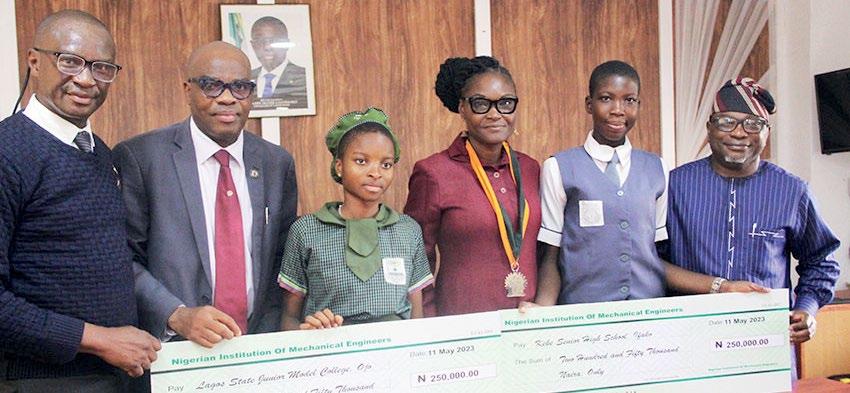
NCC to Facilitate 90% Achievement in Broadband Penetration by 2015 – Danbatta
The Executive Vice Chairman, Nigeria Communications Commissions, NCC, Prof. Umar Garba Danbatta has revealed that the commission is providing industry leadership to facilitate the achievement of 90% Broadband penetration by year 2025, and well above 50% at the end of 2023.
He said, currently, over a One Hundred and Fifty (I50) million Nigerians have access to internet, while over eighty (80) million can access high speed internet. Danbatta made this disclosure while giving a keynote speech at the ‘Talk

To The Regulator Forum’ in Yenagoa, Balyesa State on Thursday, June 1, 2023.
He stated that The Nigeria Communications Commission, in keeping with its mandate, creates opportunities to interact with its licensees on industry issues and new trends via stakeholder fora, with a view to gathering relevant information that would further advance the development of the industry, while improving regulations and service delivery to telecom consumers.
According to Danbatta, the telecom industry has witnessed milestones in more ways than one and this include the rapid growth in technology, which is redefining service delivery, and creating wide and high expectations from all stakeholders.
He said: “To keep up to date with developments in the industry, the Commission has equally taken measures to improve regulations to accommodate the rapid and continuous development. Some of the interventions and responses of the Commission includes but are not limited to:
Facilitating the Roll-Out of 5G Service provision and the Introduction of Mobile Virtual Network Operator (MVNO) Licence to bridge the gap between unserved and underserved areas. “The Commission is currently reviewing the scope and structure of its existing licenses to make them more robust and to accommodate some of the identified new industry trends.
Also in line with the Nigeria National Broadband Plan (NNBP 2020 – 2025), the NCC is providing industry leadership to facilitate the achievement of 90%
Equities Market Maintains Upward Trend as
May Tradings End
Nigeria’s equities market was investors’ delight as it rounded off activities in the fifth month of the year.
At the end of the last weekday of trading on the Nigerian Stock Exchange (NGX) Friday, a total of 455,760,646 shares in 7,457 deals, corresponding to a market value of NGN 6,117,545,328.59, were traded.
Compared with the previous NGX trading day (Thursday, June 1), Friday's data shows 17% improvement in volume, 7% improvement in turnover, but 3% decline in deals. Market capitalisation closed at N30.394 trillion as against N30.387 trillion, yielding a marginal gain of N7 billion.
Broadband penetration by year 2025, and well above 50% at the end of 2023. Currently, over a One Hundred and Fifty (I50) million Nigerians have access to internet, while over eighty (80) million can access high speed internet.”
The Executive Vice Chairman further added that the ‘Talk-To-The Regulator` Forum is a common platform for nondiscriminatory interaction on a one-onone basis, between the Licensees and the Regulator on several industry issues, pertinent to the Licensees and of national interest.

In his opening remark, Mr Mohammed Babajika, the Director , Licensing And Authorization department, NCC also added that the Commission has finalized the framework for Mobile Virtual Network Operators (MVNOs) and is currently in the process of licensing MVNOs. The licensing of MVNO will improve the telecommunication output of the country, enable the expansion and availability of quality mobile coverage and close the gap to the unserved and underserved population in Nigeria.
“While the Commission is fully committed in discharging its mandate, it can only achieve this with the cooperation and support of Licensees. The Commission therefore recognizes the importance of various service providers and seeks to constantly engage with these service providers and thereby protect the health and growth of the telecoms industry.
The Commission therefore hopes that Licensees will take advantage of this Forum to seek clarifications with respect to any issues such as: license obligations, renewal processes and procedures and emerging trends in the industry.
Mr Adeleke Adewolu, the Executive Commissioner, Stakeholder Management Nigerian Communications Commission noted that the Forum is an opportunity for Critical Stakeholders to share their respective challenges, experiences and also suggest viable solutions to the Regulator. Constant engagement with the Regulator is the path towards regulatory efficiency as it preserves the integrity of the regulatory instruments issued by the Regulator whilst securing the buy-in of all Stakeholders.
*Continues online at www. thewillnews.com
FBN Holdings Records N805.2bn in Revenue Surge as Assets Climb 18.5%
BY SAM DIALA
Revenue of FBN Holdings, the parent company of Nigeria’s oldest bank, First Bank, rose marginally by 6.4 percent to N805.2 billion in FY 2022, compared to N757.3 billion in the corresponding period.

The Tier-1 lender posted a pre-tax profit slide to N157.7 billion from N166.7 billion, while profit for the year stood at N136.2 billion, down from N151.1 billion a year earlier, according to the audited earnings report issued on Friday..
However, the assets of the 129-year-old financial services institution crossed the N10 trillion mark to N10.6 trillion as against N9 trillion in the preceding year. The surge in customers’ deposits from N5.9 trillion in 2021 to N7.2 trillion in 2022 contributed to the strong assets base.
Loans and advances to customers also increased to N3.8 trillion from N2.9 trillion, indicating the bank’s commitment to grow the economy through lending to the real sector.
Stock of the 129-year-old advanced by 1.8 per cent in Lagos on Friday, where it was quoted at N14.25 per share at the close of trade for the week.
The financial services group reached the revenue milestone riding on the wave of higher interest rates in Nigeria, which have risen 650 basis points to 18.5 per cent since May 2022, enabling lenders to charge more for loans.
Interest income, which often accounts for the lion’s share of lenders’ revenues, surged by half to N551.9 billion, according to FBN Holdings’ helping to push turnover to a record high of N805.1 billion.
The group’s financials, the last to be released by a publicly quoted lender, came more than two months after the deadline set by the Nigerian Exchange.
Growth for a net fee and commission was flattish as that income category only grew 1.1 per cent to N118 billion.
Revenue from electronic banking fees, slightly dipped by 2.3 percent during the revenue period.TEXEM AdvertTEXEM Advert
In the aggregate, 116 NGX listed equities participated in trading, ending with 29 gainers and 28 losers. Stanbic IBTC Holdings led the gainers with 10% share price appreciation closing at NGN 44.00 per share, followed by MRS Oil Nigeria (+9.92%), Conoil (+9.73%) and Eterna (+9.47%).
On the losing side, FTN Cocoa Processors came out last with an end-of-day price depreciation of 9.59% at NGN 0.66 per share, followed by UPDC (-8.93%), Chams (-8.89%) and Mutual Benefits Assurance (-7.69%). FBN Holdings recorded the highest volume of 103 million traded shares, followed by Access Holdings (55.7m), United Bank for Africa (48.8m) and Zenith Bank (21.9m).
On a weekly basis, a total turnover of 2.586 billion shares worth N46.643 billion in 35,122 deals was traded this week by investors on the floor of the Exchange, in contrast to a total of 1.963 billion shares valued at N33.899 billion that exchanged hands last week in 30,827 deals.
The Financial Services Industry (measured by volume) led the activity chart with 1.890 billion shares valued at N23.041 billion traded in 17,806 deals; thus contributing 73.10% and 49.40% to the total equity turnover volume and value respectively. The Conglomerates Industry followed with 170.218 million shares worth N638.188 million in 1,830 deals. The third place was the Consumer Goods Industry, with a turnover of 132.432 million shares worth N3.837 billion in 4,938 deals.
Trading in the top three equities namely Access Holdings Plc, United Bank for Africa Plc and FBN Holding (measured by volume) accounted for 915.908 million shares worth N10.916 billion in 6,575 deals, contributing 35.42% and 23.40% to the total equity turnover volume and value respectively.
Analysts at Cordros Securities said of the week’s performance, “We envisage extended bargain hunting in the coming week as investors continue to digest the policy direction of the new administration. However, we do not rule out intermittent profit-taking activities.
“In the medium term, we expect investors' sentiments to be influenced by developments in the macroeconomic landscape and the movement of yields in the fixed-income space.
“Lastly, we reiterate the need for positioning in only fundamentally sound stocks as the weak macro environment remains a significant headwind for corporate earnings.”
JUNE 4, 2023 THEWILL NEWSPAPER • www.thewillnigeria.com PAGE 35 THEWILLNIGERIA THEWILLNG THEWILLNIGERIA
BUSINESS NEWS
‘Ways And Means’: Expanding Debt Without Accountability

 BY OLUSEUN ONIGBINDE
BY OLUSEUN ONIGBINDE
Nigeria’s upper legislature recently approved N23.7 trillion to be securitised, a move that raises Nigeria’s aggregate debt from N46 trillion to N70 trillion. The lawmakers later amended the CBN Act to accommodate more loans via ways and means and to avoid government running afoul of the process.
Nigeria’s debt-to-GDP has now risen from 23.2 per cent to 35.1 per cent, meaning it might need to raise its 40 per cent debt limit in the nearest future. Nigeria’s ‘ways and means’ advances (pejoratively known as ‘money printing’) grew from N790 billion in May 2015 to N23.7 trillion in 2022.
This means the Central Bank of Nigeria (CBN) has been lending to the Federal Government against its laws, which stipulate that the government is not supposed to borrow more than five per cent of its previous year’s revenues from the CBN.

In fact, the CBN breached this rule by lending the Federal Government up to 91.27 per cent of its 2021 revenues in 2022, throwing fiscal guardrails to the dust. This process was breached serially, and the current securitisation is the validation of the illegality.
Several governance issues have now been brought to the fore, highlighting perennial issues relating to the erosion of public sector accountability, improper fiscal management, and a continued misunderstanding of the role of separation of powers. Hence, there are a few things to consider due to this approach.
While the Federal Government continued to expand its budget expenditure and revenues were not anchored on realistic projections, it used the ‘ways and means’ copiously to shore up expenditure, denying the opportunity to rationalise expenditure and set priorities in line with revenues.
It is a well-known approach as extra-budgetary support from monetary authorities is usually laid with conditions for fiscal consolidation or operational efficiency.
Apart from raising the domestic debt from N8.8 trillion in December 2015 to N27.6 trillion in December 2022 and foreign debt from $10.7 billion in June 2015 to $37.23 billion by December 2022, the Federal Government continued on a borrowing spree, without considering that it was an optimising expenditure.
If the Federal Government has the leeway to borrow money indiscriminately from the CBN, what then is its incentive to grow revenues? Will taxes remain the fiscal option to provide equilibrium in society if the CBN continues to inject funds into the system in a haphazard manner?
For instance, during high oil prices, the Federal Government showed no urgency to grow production to benefit from the windfall, as oil production collapsed to a nearly 20-year low of 900,000 barrels per day.

At the initial review, the National Assembly requested
details of the Federal Government’s funds use that justified the securitisation. No response was given to this demand, and it is puzzling that the Senate still approved it nonetheless. It went further to amend the CBN Act to accommodate more ways and means from the federal government.
Accumulating debt for sustainability purposes should come with the clarity of funds allocation and use to help assess if they are applied to self-liquidating projects or have the capabilities to further generate revenues in the near or long term. The absurd part of the ‘ways and means’ situation is that Nigeria largely borrowed these funds to finance consumption, as
shown in the recurrent funding gap.
This reinforces the notion that the ‘ways and means’ financing has been converted to a budget funding instrument, as opposed to the liquidity support it was intended to be. While the Federal Government has secured a moratorium of three years before the interest (at nine per cent) would start to be paid, what says that the Federal Government’s “grace” period would not be extended?
Is it not possible that the debt service costs can be paid to CBN, only to be borrowed again? In every element of social justice and in line with the Fiscal Responsibility Act, debt should be used for capital projects and human capital development. Still, the Federal Government used the ‘ways and means’ to cover its recurrent shortfalls. Nigeria might have distorted its fiscal structure.
The inability of the Federal Government to control itself with regard to the continuous exploitation of the ‘ways and means’ facility may show a deeper problem of an executive arm of government that cannot abide by its own rules. Such a scenario smacks of ‘Rule by Law’ (as opposed to ‘Rule of Law’), where laws and rules exist for everyone, except those in government or those powerful enough to change the laws.
Over the years, different organisations have reiterated that the ‘ways and means’ advances significantly impact devaluation and inflation, as they continue to increase the money supply without commensurate asset backing. However, the Ninth National Assembly, through its Appropriation and Public Accounts Committees, did not apply the necessary oversight to ensure that the law was kept. It also means that the executive can continue to break the rules and use the National Assembly to validate such abuse at the end of the period.
Between 2019 and 2022 (which mainly captured the Ninth National Assembly), the ‘ways and means’ advanced to the Federal Government reached N18.3 trillion. This was 77 per cent of the total amount securitised, which explains that every level of scrutiny was clearly suspended.
Even if the executive intended to approach the National Assembly, the former should have asked for an amendment of the relevant section of the CBN Act to allow for a larger threshold for the size of advances it aims for.
Another critical point to note is that the volume of debt securitised was a stock and not a flow.
What will happen to the ‘ways and means’ that was obtained after the request to securitise the N23.7 trillion was made? What deterrence is in place to prevent future debt accumulation through ‘ways and means’ even though the CBN Act has been expanded to accommodate more loans?
Previous administrations have tried to limit the national debt due to its potentially corrosive effect on public revenues (famous efforts such as the Paris Club exit in 2005 and its impact on sovereign risk ratings cum cost of borrowing). Previous administrations also expanded ‘buffer funds’, such as the Excess Crude Accounts and Sovereign Wealth Fund, which helped the country weather the global recession crisis.
The Buhari-led government suspended the rules of fiscal prudence and leaned on the CBN beyond acceptable limits. This broke the independence of the Central Bank and made price stability its undesired target, as inflation galloped to 22 per cent and gradually eased the national currency from being an assured store of value.
It behoves the new administration to check the overwhelming presence of the monetary institution; else, we might continue on this irrecoverable slope in which the apex bank is fully degraded to a mere Federal Government parastatal.
•Oluseun Onigbinde is co-founder of BudgIT, a civic organisation focused on strengthening civic engagement and institutional accountability.
JUNE 4, 2023 THEWILL NEWSPAPER • www.thewillnigeria.com PAGE 36 THEWILLNIGERIA THEWILLNG THEWILLNIGERIA
“ ECONOMY
The absurd part of the ‘ways and means’ situation is that Nigeria largely borrowed these funds to finance consumption, as shown in the recurrent funding gap
Emefiele
SHOTS OF THE WEEK
Photo Editor: Peace Udugba [08033050729]



L-R: Secretary General, International Chamber of Commerce (ICC), John W.H. Denton; Dorothy Udeme Ufot, Chairman, ICCN Commission on Arbitration and ADR; Chairman of Heirs Holding and Founder of Elumelu Foundation, Tony Elumelu, CFR; President, ICC International Court of Arbitration, Paris, Claudia Solomon; Group Chief Executive Officer, Nigerian Exchange Group, Oscar N. Onyema, OON; Council Member, ICC Nigeria, Omolara Akanji and Chairman, ICC Nigeria, Babatunde Savage, during the 7th ICC Africa Conference, on International Arbitration in Lagos on June 1, 2023.
L-R: ED, Retail and Digital Bank, Wema Bank, Tunde Mabawonku; DMD, Wema Bank, Wole Akinleye; Divisional Head, People Brands & Culture, Wema Bank, Ololade Ogungbenro; Nigerian Artists, David Adeleke (a.k.a) Davido; MD/CEO, Wema Bank, Moruf Oseni; Head, Brands & Marketing Communications, Wema Bank, Mabel Adeteye; ED, North and South–South Bank, Wema Bank, Emeka Obiagwu and COO, Wema Bank, Tajudeen Bakare, during Davido’s visit to Wema Bank’s new MD/CEO, Mr. Moruf Oseni, in celebration of Alat at 6, at Wema Bank’s Head Office, Marina, Lagos on May 31, 2023


L-R: Executive Director Commercial, NASCON Allied Industries Plc, Fatima Aliko-Dangote; Non-Executive Director, Olakunle Alake; Independent Non-Executive Director, Prof. Chris Ogbechie; Chairperson, Yemisi Ayeni and Acting Managing Director, Thabo Mabe, during the 2022 Annual General Meeting (AGM) of NASCON Allied Industries Plc, in Lagos on May 31, 2023.

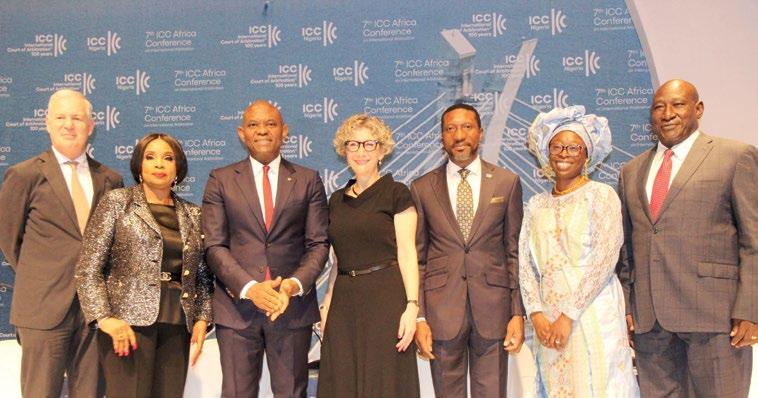
L-R: Executive Head of Marketing, MultiChoice Nigeria, Tope Oshunkeye; Chief Executive Officer, Flykite Productions, Jenkins Alumona; Board member, Nigeria Football Federation, Mr. Ganiyu Majekodunmi; Analyst, Sponsorship and Promotions, MTN, Peter Kajovo and Media Consultant, MTN, Benjamin Elum, at the Naija Super 8 unveiling ceremony, held in Lagos om May 31, 2023.
L-R: Third Miss Aviation Nigeria, Mayowa Mohammed; Nigeria Top Model Miss Aviation, Priscilla Eterikoko; Alvina Yiunsa; receiving books from President/founder Peoples Dream initiative, Ibobo Melvin Igbagi, during Book Fair/ free books to mark the Children’s Day for all children, organised by Peoples Dream Initiative, held in Lagos on May31, 2023.

L-R: Manager, Sustainability and Impact Reporting, MTN Foundation, Edward Fagbohun; Executive Secretary, MTN Foundation, Odunayo Sanya; MTN Y’ellopreneur, Mary Otor-Uwua; Group Chief Operating Officer, RedSlate Group, Nkiru Oguadinma and Chief Operating Officer, MoMo PSB, Elsa Muzzolini, at the MoMo-Y’ellopreneur forum in Lagos on May 27, 2023.

JUNE 4, 2023 THEWILL NEWSPAPER • www.thewillnigeria.com PAGE 37 THEWILLNIGERIA THEWILLNG THEWILLNIGERIA
BOLA


The Master Strategist Who Plotted His Way to The Presidency
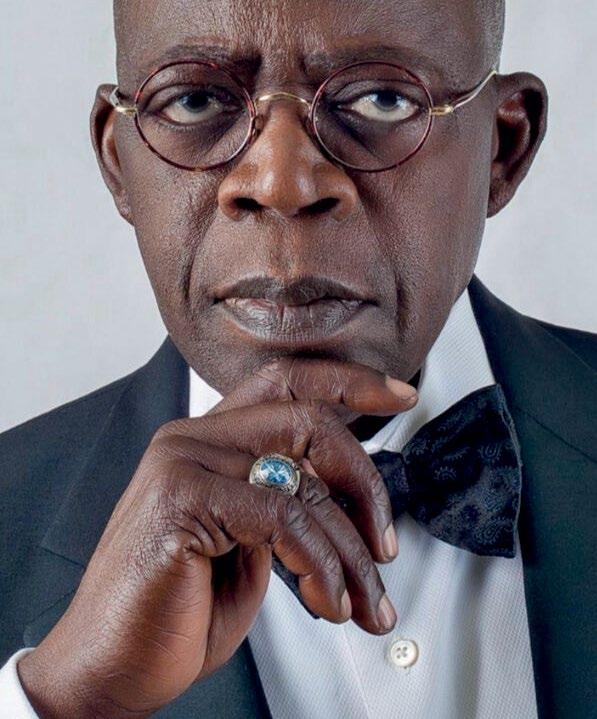

JUNE 4, 2023 THEWILL NEWSPAPER • www.thewillnigeria.com PAGE 38 THEWILLNIGERIA THEWILLNG THEWILLNIGERIA JUNE 4, 2023 THEWILL NEWSPAPER • www.thewillnigeria.com PAGE 38-43
AHMED TINUBU
Asiwaju Bola Ahmed Tinubu on May 29, 2023 finally fulfilled his lifelong ambition to become President of the Federal Republic of Nigeria. While the journey to the highest office in the country wasn't without its own fair share of challenges, which eventually proved surmountable, it is pertinent to note that the arduous task of getting the 'crown' took several years of preparation, one in which he invested, built political capital and formed alliances across the country. But who really is the man, Bola Ahmed Tinubu beyond his political antecedents? IVORY UKONU examines the various factors that have shaped President Bola Ahmed Tinubu:
FROM CITY BOY TO PRESIDENT: BOLA TINUBU'S LONG WALK to ASO ROCK
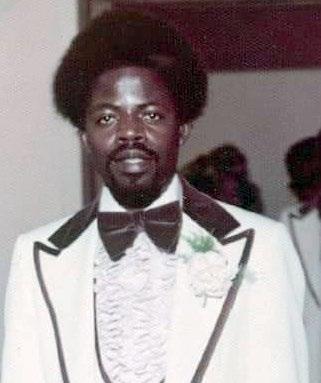
Career in Accounting



Afew years after his birth on March 29 1952, Tinubu enrolled at St. John’s Primary School, Aroloya, Lagos and Children’s Home School in Ibadan, Oyo State for his primary and secondary education. In the mid-1970s he moved to the United States, working a variety of jobs to avoid being dependent on his family back home. He worked as a cab driver, a security man, a door guard, a dishwasher, and room service personnel, while he finished his college education. Transcripts show that he attended Southwest College (now Richard J. Daley College) in Chicago and then transferred to Chicago State University, where he earned a degree in 1979.

Stint in National Assembly
Tinubu ventured into politics in 1992 on the platform of the Social Democratic Party of Nigeria (SDP). He belonged to a faction of the party called the Peoples Front. The faction was led by late Shehu Musa Yar’Adua. Two prominent members of the group were former Kano State governor and former presidential candidate of the New Nigeria Peoples Party, NNPP, Rabiu Kwankwaso and former Vice President Atiku Abubakar, the presidential candidate of the Peoples Democratic Party, PDP.

The following year, Tinubu was elected to the National Assembly, to represent the Lagos West Senatorial District. As a senator, he was the chairman of the Appropriation, Finance, and Banking committee. He was also easily the most popular lawmaker in the Senate.
Accounting had been the focus of his studies while in the university. Upon graduation, he was eligible for several job offers from big accounting firms in the United States, such as Arthur Andersen, Arthur Young, Ernst and Whinney, Peat Marwick and Mitchell, Deloitte, IBM, Arthur Young, Deloitte, Haskins and Sells, etc. But taking the advice of his professor to choose a company where he would learn from and be relevant to his country, he chose to work with Deloitte and Touche because their clients were in the oil and gas sector and Nigeria was already an oil-producing country. It may not be out of place to imagine that perhaps, this was when the seed for national relevance was sowed in him. He would also work with General Telephone and Electronics (GTE) where he experienced firsthand racism and discrimination. He resigned his appointment and went on to work at Mobil, United Kingdom. In 1983, he returned to Nigeria and joined Mobil Nigeria where he started off as an auditor. In no time, he rose to the position of Treasurer. He was one of those who spearheaded the construction of the Mobile Nigeria House.
JUNE 4, 2023 THEWILL NEWSPAPER • www.thewillnigeria.com PAGE 39 THEWILLNIGERIA THEWILLNG THEWILLNIGERIA
Education
Following the annulment of the June 12, 1993 presidential election, Tinubu, alongside other pro-democratic politicians founded the National Democratic Coalition (NADECO), to restore democracy and to ensure that the June 12 election result was reinstated.
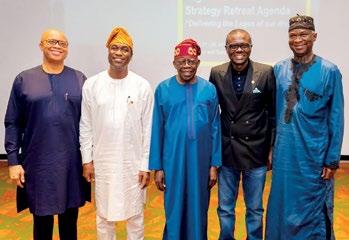
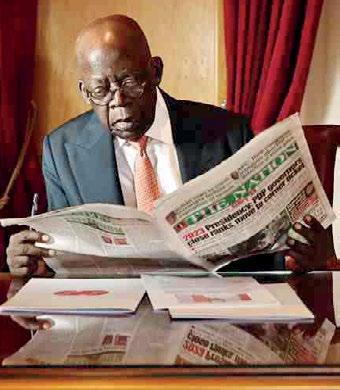


He spent his money to mobilise opposition groups at home and abroad. He was central to the success of NADECO. But the activities of the group were not pleasing to the late General Sani Abacha, the military Head of State at the time, who wanted to nip it in the bud by going after the arrowheads.
A trusted source who was Tinubu’s informant had asked him to prepare to leave the country as his safety could no longer be guaranteed. So first, he went into hiding. His hideout was somewhere off Awolowo Way, Ikoyi from where he had to go on a compulsory exile to Benin Republic and then to the United Kingdom in 1994. He was away for about six years.
On his return, following the death of Abacha in 1998, he hibernated in one of his Lagos houses situated somewhere in Alausa, where his late adopted mum, Alhaja Abibatu Mogaji used to live until her death.

Life as Governor
Shortly after the death of Abacha, Tinubu contested for the position of Executive Governor of Lagos State on the platform of the Alliance for Democracy (AD). He won the election and became the Governor of Lagos State in May 1999.
As governor, he didn't exactly do much. For instance, a light rail project he started is yet to be completed after 20 years. It is however believed that under his guidance, his successors, all of whom he handpicked, elevated the status of the state in line with his own blueprint for how the state should be developed.
Tinubu’s tenure came to an end on May 29, 2007 when his chief of staff, Babatunde Raji Fashola succeeded him.


Life as Political Godfather
Following the end of his governorship tenure, Tinubu assumed the role of a godfather and king maker, using an extensive patronage of network to back candidates for various offices, particularly in the South-West. He is also known to have either helped to set up people in various business endeavours or invested in their business ideas to give them leverage.
He also spent years building his power base, from the private sector to the public sector, to the political arena, all through to market cooperatives, transport unions in Lagos - he built a nationwide network of contacts in preparation for such a time as this. Also, his tight grip over Lagos State ensured his staying power never waned.
Besides co-founding AD which later became Action Congress of Nigeria, ACN, the political party on which he emerged governor and financing it, he was instrumental in bringing together other parties and creating a mega opposition party with the merger of ACN, the Congress for Progressive Change (CPC), the All Nigeria Peoples Party (ANPP), a faction of the All Progressives Grand Alliance (APGA) and the new Peoples Democratic Party (nPDP), a faction of the then ruling PDP, into the All Progressives Congress (APC). This merger helped push ex-President Muhammadu Buhari to victory in 2015, ending 16 years in power for the opposition Peoples Democratic Party (PDP).


Business Interests

Although it is believed that he has his hands in several pies, only three major enterprises have been openly identified with him. On July 31, 2006, he founded 'The Nation' Newspaper, a daily newspaper published in Lagos State. In 2010, he invested heavily into First Nation Airways, formerly Bellview Airline. It was headquartered in Lagos with the main promoter of the defunct Bellview Airline, Kayode Odukoya as its pioneer Managing Director.

In 2018, First Nation Airways was suspended for unauthorised and illegal operations, following the flagrant and continuous violation of the terms and conditions of the issuance of the Air Operators Certificate, AOC, by the Nigerian Civil Aviation Regulation, NCAA. The airline did not have at least two airworthy aircraft capable of servicing its approved schedule as required of it. In 2012, Tinubu floated Television Continental, TVC, a 24-hour news television based in Lagos.
Cat With Nine Lives
On December 13, 1999, as Lagos State governor, Bola Tinubu escaped an assassination attempt in which four other people were killed. The attackers shot at his convoy while he was on his way home from a tour of waste collection operations and security arrangements in the city. The then Commissioner of Police in the state, Mike Okiro, blamed the attack on the Oodua People's Congress, OPC. The group was blamed for several outbreaks of ethnic violence in the state in which over 100 people died. Tinubu later said that the attack reinforced his position that the state needed at least 20,000 additional policemen to safeguard the lives and properties of 8 million residents of Lagos at that time. Again, in March 2009, a plot allegedly hatched to assassinate him was identified and scuttled.
JUNE 4, 2023 THEWILL NEWSPAPER • www.thewillnigeria.com PAGE 40
THEWILLNIGERIA THEWILLNG THEWILLNIGERIA
NADECO Days
Tinubu and Momodu
Tinubu with one day governor
Tinubu and Buhari
Akabueze, Hamzat, Tinubu, Sanwo-Olu and Fashola
Banire, Edu, Alake, late Nelson, Tinubu, Lawal, Osinbajo, Aregbesola and Pitan
Notable chieftaincy titles


Although Tinubu holds several traditional chieftaincy titles, two of them however stand out. He is the Asiwaju of Lagos and also the Jagaban of Borgu Kingdom, Niger State. He was installed as 'Asiwaju' by the late Oba of Lagos, Oba Adeyinka Oyekan some years ago. It is one of the most revered chieftaincy titles in Yorubaland given to only individuals who have distinguished themselves in the community where they live. Asiwaju means ‘frontrunner’ in the development and progress of a community.
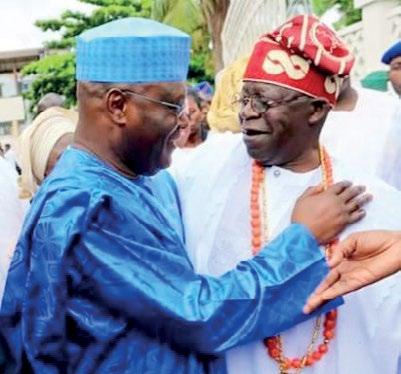
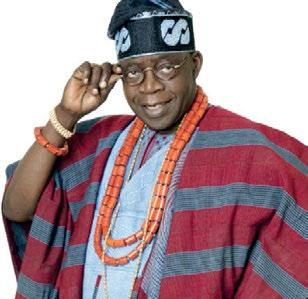
In 2006, the late Emir of Borgu, Alhaji Haliru Dantoro Kitoro III, honoured him with the title, 'Jagaban' of Borgu. The title is a Hausa word meaning ‘leader or front-runner’. Borgu Kingdom used to be under the Oyo Empire and the 'Jagaban' of Borgu was the right hand man of the Aare Ona Kakanfo (army chief of Yoruba land) during wars against enemies of Oyo empire. So the Emir gave him this title for his unconditional service and time-tested leadership roles.
Journey to Presidency
Tinubu's first attempt to launch himself to the seat of power was in 2006 when he tried to persuade former Vice President Atiku Abubakar and two-time presidential candidate of the Peoples Democratic Party, PDP, to become the head of his political party, the Action Congress of Nigeria (ACN). Abubakar, who was a member of the People's Democratic Party (PDP), had fallen out with then President Olusegun Obasanjo over his ambition to succeed him as president. Tinubu offered him an opportunity to switch parties and join the ACN, offering him his party's presidential candidacy, with the condition that he, Tinubu, would be Atiku's running mate. Atiku declined the proposition. Despite switching to ACN, he chose someone other than Tinubu. The party failed woefully at the polls.

Tinubu’s second attempt was before the All Progressives Congress, APC primaries of 2015. Tinubu had hoped to be former President Muhammadu Buhari's running mate after a successful merger of the ACN, Congress for Progressive Change, CPC (Buhari’s party) and several other splinter parties. Again, his ambition was dead on arrival as several people within the party opposed a Muslim/Muslim ticket, which they envisaged would make the party lose the presidential election.
In 2022, he not only emerged as a presidential aspirant on the platform of the All Progressives Congress, APC, but also flew the Muslim/Muslim kite and despite opposition from several quarters, contested the presidential election and was subsequently declared winner by the Independent National Electoral Commission, INEC.

Loving Husband
In 1987, Tinubu married Delta State-born Oluremi whom he met through her sister. Although he is a Muslim, Remi is a Christian and an ordained pastor with the Redeemed Christian Church of God, RCCG. Remi's dad reportedly warned Tinubu to ensure his daughter did not switch from her faith and he obeyed. Although their three children together bear Muslim names, they were raised in the Christian faith. They have been married for over three decades. Despite being controversial individuals, they have managed to keep their marriage scandal free. With Tinubu being the head of his close-knit dynasty, Remi, a former three-time senator, is well known to be the 'neck that guides the 'head' in making very important and crucial decisions. A silent operator, she does this without blowing her trumpet. However, since her husband's emergence as the president-elect, the 63-year-old has not shied from asserting her authority. This was evident in the powerful speech she delivered at the Aso Villa Chapel where in apparent response to former Vice President Yemi Osinbajo's admonition to the President to do what is right and shun corruption. Remi reiterated that God had indeed blessed her family and they therefore do not need the wealth of Nigeria to survive but to do the right thing. Before Remi, Tibubu had fathered children with another woman, he never openly acknowledged. She died in 2018.


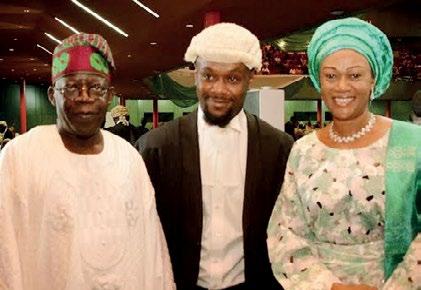

Loving Father And Grandfather
The President has six children. The older three, Jide (who is late), Folashade and Seyi, all have different mothers, while the last three daughters, Zainab, Abibat, Olayinka, belong to Remi. Having had the best of education in America, Tinubu ensured he did the same for his children. Until his death in October 2017 from cardiac arrest at the age of 43, Jide lived in London with his wife and three children. He was a graduate of the University of Liverpool, England where he obtained a degree in Law. Folashade, who used to be the Iyaloja-General of Lagos State which gave her authority over all traders in the state, is now the Iyaloja-General of Nigeria. This means she will now be in charge of all markets in Nigeria. She has a degree in Business Administration from the Middlesex University, London as well as a Master’s degree in the same course. Following her father's inauguration, the 47-year-old quickly unveiled a nongovernmental organisation called Friends of Iyaloja Initiative (FoI). According to her, she plans to use her little wealth of experience, connections and human resources available to her to support her dad’s administration. The NGO will also focus on youth and women empowerment. Folashade used to be married, to Oyetunde Oladimeji Ojo, a former member of the House of Representative representing Ijero/Efon/Ekiti West, Ekiti State in the 7th National Assembly. They have allegedly parted ways.


Tinubu-Ojo
The third child, Seyi, was born to Tinubu by a former air hostess turned prophetess, Bunmi Oshonaike, in 1985. He graduated with a Law degree from Lincoln University and a Master’s degree in Corporate and Commercial law from the University of Buckingham. Seyi runs Loatsad Promomedia Limited, an outdoor advertising company. He also runs a non-profit organisation, Noella Foundation, focused on job creation. He is married to a Nigerian/Lebanese called Layal and the marriage is blessed with two children. He also has a son with beauty entrepreneur, Freda Francis. Then there is Zainab Abisola, Habibat, a graduate of Music from Berklee College of Music, Boston, USA and Olayinka.

Also, President Tinubu has eight grandchildren: Three from his late first son, Jide; three from his second son, Seyi and two from Folashade. He dotes on all his grandchildren.

JUNE 4, 2023 THEWILL NEWSPAPER • www.thewillnigeria.com PAGE 41
THEWILLNIGERIA THEWILLNG THEWILLNIGERIA
Late Oba Oyekan, Abiola and Tinubu
Abubakar and Tinubu
The Tinubus
Tinubu and his grand children
The Tinubus and the Buharis
The Tinubus
STORIES BY IVORY UKONU
JIM OVIA’S RELATIONSHIP WITH PRESIDENT TINUBU Ireti Asemota Marks First Anniversary of Late Husband's Death
Some argue that he is one of the wealthiest bankers in Nigeria. He has also been described as the godfather of modern banking in Nigeria by Forbes because of his business dexterity and leadership skills. Whatever the fancy appellation attached to him may be, one thing for sure is that Jim Ovia, the chairman of Zenith Bank Plc detests publicity like a plague and prefers his works in the business community speak for him rather than make a showmanship of
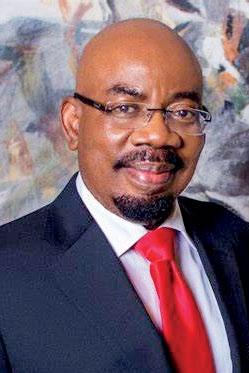
it. In addition, he has a penchant for making behind the scenes moves along the corridors of power and keeping such moves to himself without the need to announce it or subtly show off. A case in point is his close relationship with President Bola Ahmed Tinubu which he has never flaunted and how he has always made silent deft moves in support of him all through the years. Besides paying a personal visit to Tony Elumelu, the Chairman of United Bank for Africa, shortly after he was pronounced president-elect by the Independent National Electoral Commission, INEC, supposedly to thank him for standing by him in the pursuit of his presidential ambition, Tinubu also paid a personal visit to Jim which was not documented for public consumption. Infact, Jim was the first person he met with after his declaration as presidentelect. Jim's relationship with Tinubu began pre-1999 and

peaked at the return of democracy when he heavily funded Tinubu's gubernatorial campaign as governor of Lagos State. Since then, their relationship which has never been public knowledge has blossomed with Jim silently supporting Tinubu in his quest to realise his ultimate political ambition. So powerful and highly connected is Jim that he influenced the appointment of two of his banking proteges in the corridors of power. He influenced Godwin Emefiele's appointment as the governor of the Central Bank of Nigeria, CBN and influenced the choice of Kashim Shettima as the Vice-Presidential candidate. Although many opposed Shettima's nomination because he was not a popular and favourable choice, however, Jim's relationship and his longstanding support to Tinubu over the years was too important to be shoved aside. These and many more he has been doing without making noise. So for a man who has remained influential all through the administrations of all of Nigeria's democratically elected presidents beginning from Olusegun Obasanjo up until now with Tinubu at the helms of affairs, one may have to think twice before underrating or underestimating the unassuming Jim Ovia.
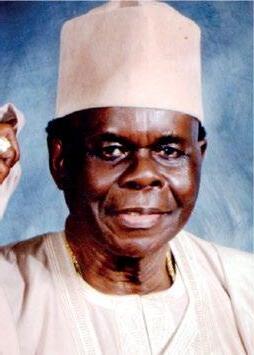
Seyi Tinubu, Wife Reunite For Father's Inauguration
It looks like all is finally well in the household of Seyi Tinubu, the first son of President Bola Tinubu, following the subtle altercation that led to him and his wife, Layal maintaining a dignified distance over Seyi's indiscretion. The couple put their differences aside to attend the inauguration of his father on May 29 at the Eagles Square and later at the presidential ball. Both of them looked radiant as they watched history being made. It was the first time that Layal would openly identify with her father in-law's presidential ambition after keeping her distance from the family. A cursory look at her social media page suggested no sign of her promoting his political ambition or of her congratulating him when he was declared presidentelect. Although there was a video of her and Seyi at the polling unit on the day of

the presidential election, the video which was meant to silence critics that all is well in their marriage did little or nothing to change that rhetoric going by how cold Layal was towards Seyi in the video. Only about two months ago, it was obvious that tension still brewed between them when Seyi refused to congratulate his wife on the day she unveiled the second outlet of her children's toy shop and learning space. The day which also coincided with her birthday, went by as a normal day as he also did not wish her a happy birthday suggesting that tempers were yet to simmer between them after Seyi was exposed for still having a secret affair with his mistress, a Lagos based socialite and businesswoman. Hopefully, the Eagles Square reunion isn't just for show and they are indeed back together for good.
OLORI MARIAM LAWAL MARKS QUIET BIRTHDAY

Afew days ago, Olori Mariam Lawal, wife of the Oniru of Iru land, Oba Abdul-Wasiu Omogbolahan Lawal, Abisogun II, clocked 52. Save for a photo shoot, the self-effacing queen chose not to have an elaborate party, but instead celebrated quietly within her enclave by hosting a few close friends and family. Besides, her birthday coincided with the festivities of the presidential inauguration where her husband was fully present and so, she was happy to make do with just a mini celebration. Her husband did however take time out of his busy schedule to serenade her with beautiful words as the apple of his eyes. A mother of two and a fashionista, the former police officer just like her husband, is a successful businesswoman who runs a string of businesses with her tentacles extending to the oil and gas business. She is also a philanthropist.


Last weekend, Ireti Asemota, widow of Chief Sunny Asemota alongside her children, hosted the creme of high society to the one year remembrance anniversary of her late husband. The matriarch of high society kicked off the ceremony with a thanksgiving church service at the All Saints Church, Yaba, Lagos. Thereafter, a private lunch was held at her palatial residence. Some of the socialites that attended were Erelu Abiola Dosunmu, Oyin Adenuga-Odufeko, Folarin Coker, Chief Mrs Biodun Aisen, Yewande Onileere, Olori Ladun Sijuade, Chief Mrs Sheri Balogun etc. The patriarch of the Asemota family passed on in May 2022 at the age of 87. An auto magnate of repute and founder of Sunny Motors, the late Chief Sunny was one of the wealthiest Nigerians whose indelible footprints in Nigeria’s auto business have remained a reference point for many decades. Not one to be associated with anything that has no class, Chief Sunny was extremely wealthy and lived a lifestyle of luxury. About 10 years ago, he retired from
active work having successfully nurtured his auto companies from infancy to multi-billion enterprises which are now being ably run professionally by his three children, Osa, Iredia and Omoregie. One of his children, Oghogho, who used to be married to Ayo Adedoyin before the marriage crashed after a decade, runs Aralia by Nature, a landscape design company. Until his death, Chief Sunny and his wife, Ireti dominated the social scene for decades, a feat that earned them a legendary status of some sort.
Biola Alabi’s Role in Big Leagues

Atop player in the media industry, Biola Alabi, is admired for her brains and gut. She is endowed with great poise and infectious charm. As one who has been dedicated to supporting African founders and fund managers to help build a sustainable African ecosystem, the media mogul was recently announced as one of the latest recipients of the 2023 Diversity VC Unlocked, a Silicon Valley Scholarship of the 500 Global, a venture capital firm on a
mission to uplift people and economies around the world through entrepreneurship. The invite-only, educational program is in collaboration with the Stanford University Center for Professional Development for emerging leaders who want to shape the future of the venture capital industry. The program is taught by Stanford University faculty and 500 Global leaders who share their knowledge and expertise in live, interactive sessions. A former Managing Director for M-Net Africa, a part of the globallyrenowned Naspers Group, Biola heads her own media firm, Biola Alabi Media (BAM), a production company that produces TV series and movies for the Nigerian market. She is an active angel investor and advisor in the fast-growing African technology and media startup ecosystem. She is also a limited partner in numerous funds, with investments in companies like Trove Technologies and Chekkit, a Non-Executive Director at Unilever Nigeria PLC, a member of the board of directors at Monty Mobile, and the Chairwoman of Big Cabal Media.
JUNE 4, 2023 THEWILL NEWSPAPER • www.thewillnigeria.com PAGE 42 THEWILLNIGERIA THEWILLNG THEWILLNIGERIA
Mariam
Ovia
Asemota
Alabi
The Tinubus
STORIES BY SHADE WESLEY-METIBOGUN
PAUL USORO APPOINTED CHAIRMAN OF ACCESS BANK
Paul Usoro, the former President of the Nigerian Bar Association, NBA, and a Senior Advocate of Nigeria, SAN, has been appointed as Chairman of Access Bank Plc. The legal luminary joined Access Bank Board in 2014. He has chaired the bank's board in different capacities, as board of human resources and sustainability committee and then Technical Committee on Retail Expansion. He is also the Vice-Chairman of the Board’s Risk Management. He has also represented Access Bank as a Non-Executive Director on the board of the defunct Intercontinental Bank Plc. The graduate of law from the

University of Ife, now Obafemi Awolowo University, OAU, who graduated in 1981 and was called to bar the next year, has put in over 30 years’ experience in legal practice. He is a highly experienced litigator and communication law expert. He is also a Fellow of the Chartered Institute of Arbitrators and the founder, Senior Partner of Paul Usoro and Co.
Usoro was elected the president of

Abiodun, Amosun Still at Loggerheads

Governor Dapo Abiodun of Ogun State and his predecessor, Ibikunle Amosun, seem to enjoy playing cat-and-mouse all the time and there appears to be no end to their frosty relationship yet. Verbal altercations between the two have escalated once again. Both men recently traded words during the inauguration of the Dangote Petroleum Refinery and Petrochemical Plant at the Lekki Free Zone area in Lagos State.
A former governorship aspirant in Ogun State, Segun Sowunmi, had blamed the Ogun State Government for losing the investment to Lagos State. The two politicians who witnessed the inauguration had to respond to Sowumi's accusation by shifting the blame to each other. In a statement issued by his Chief Press Secretary, Kunle Somorin, Abiodun made it known that Amosun was the one who frustrated his efforts at having the refinery sited in Ogun State. He explained that the refinery was initially planned to be located at the Olokola Free Trade Zone,
NBA in 2018, he served two terms before moving to PZ Cusson Nigeria Plc where he was made the NonExecutive Director.
Late Sultan Dasuki Granted Official Pardon After 27 Years
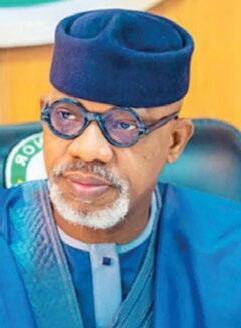
The late Sultan of Sokoto, Ibrahim Dasuki, has been granted official pardon by the Sokoto State Government and cleared of any wrongdoing.
Twenty-seven years ago, the traditional ruler was accused of
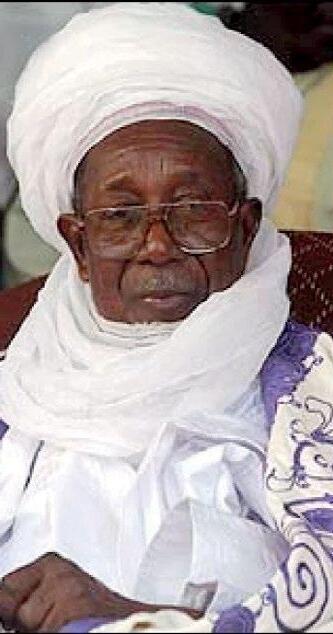
insubordination by the military regime of late General Sani Abacha. In 1996, Dasuki was deposed after he was called into the office of the then military administrator of Sokoto State, Yakubu Muazu. He was first taken to Yola and later sent on exile.
According to Muazu, the Sultan was deposed because he was too modern and independent-minded. He was alleged to have ignored government directives and often travelled outside his domain without approval or notice from the government. However, beyond Muazu's explanation, most people believed there was more to his removal which was not stated. The Sultan had personal issues with the then military Head of State. Abacha and Dasuki's son in law, Aliyu, were classmates and business partners. But Aliyu unfortunately died in 1992 and his business was handed over to the Sultan. After taking over the business, the Sultan
asked Abacha to produce evidence of payment of any claims, since he was the one handling Aliyu's business. Abacha was not obviously comfortable with such a decision as a partner. He subsequently became very hostile toward Dasuki and plotted against his downfall. The hostility led to the Sultan's removal and forceful exile. The Sultan's entitlements and salary were withheld, including the ones he was supposed to have received before he was deposed. In a twist of fate, the Sokoto State Government exonerated the late Dasuki of wrongdoings and ordered all accumulated benefits to be paid to his family.
The immediate past Governor of the state, Aminu Tambuwal, had ordered an investigation into the late Sultan's case and it was discovered that there was no evidence to support any incriminating acts that would justify his deposition. The committee further highlighted that the Sultan was denied the right to defend himself as required by the laws of the land. The findings of the committee made the former governor exonerate him of any wrong.
This development came 27 years after the unfortunate event took place and seven years after the death of the Sultan.
in the Ogun Waterside Local Government Area.
Reacting through his media team, represented by Bola Adeyemi, Amosun stated that the Olokola Free Trade Zone was not solely owned by Ogun State. Describing Abiodun’s claim as untrue, he said that Ogun State was not in a position to unilaterally frustrate the project nor was it responsible for Dangote’s withdrawal as the state only owned 14.5 percent equity shares, while the Federal Government of Nigeria owned the majority share, which is
51 percent, the Ondo State Government had 14.5 per cent and strategic core investors had 20 per cent.
Amosun added that Dangote made his own business decisions according to the goals of his business strategy and risk assessment. One would expect the two politicians, who are members of the All Progressives Congress (APC), to find a common ground to settle their differences, but they don’t seem to be in a hurry to do so.
Billionaire businessman, Femi Otedola, will not forget the late astute banker, Otunba Subomi Balogun in a hurry. Balogun was a reliable ally to the businessman when he was at his lowest financially. A few days ago, Balogun, the founder of First City Monument Bank, FCMB died in London, United Kingdom, at the age of 89. Otedola adopted Balogun as
Wunmi
Singer Wunmi Obe has marked the fifth anniversary of her brother, Gbadebowale Wayne Aboderin’s death. Aboderin died in 2018 due to complications arising from a heart surgery at the First Cardiology Consultants, Ikoyi, Lagos, at the age of 60.

Taking to her social media, the show business entrepreneur celebrated the life and times of her late brother. She posted a photograph of the deceased with an emotional


his father after he lost his biological father, Sir Michael Otedola, a former Governor of Lagos State who died in 2014.
At the height of the global financial meltdown between 2007 and 2009, Otedola's businesses, especially in the downstream oil and gas industry, were challenged. He had a diesel stock, which was bought for $800,000,000 (eight hundred million dollars) at $147 per barrel. However, due to the meltdown, the price of oil collapsed to $33 per barrel. Otedola’s business nose-dived

and he was on the verge of being declared bankrupt. The situation got so worse that he became incapacitated and almost contemplated suicide. When he finally made an attempt to approach the bank, two top bankers who understood real entrepreneurship, came to his rescue. They were Otunba Balogun and Tayo Aderinokun, cofounder of Guaranty Trust Bank, GTB, who later died in 2011 at Wellington Hospital in the United States as a result of a protracted illness, offered to help. The two believed in his dreams and were able to rescue his business.
note that captures how his family missed his absence. And the fact that they have to live with the sweet memories they shared before his death.
Late Gbadebowale Aboderin was the Chairman, PUNCH Commercial Printing Limited and Lukahed Properties Limited before his demise.
Trained as a pilot in the United States, he was also a sport enthusiast and philanthropist. He was the founder and chairman of the Dolphins Female Basketball
Foundation, and also a former chairman of the Lagos State Basketball Association and onetime vice-president of the Nigerian Basketball Supporters Club. The singer had earlier lost one of her brothers, Jaiye Aboderin in 2014.
JUNE 4, 2023 THEWILL NEWSPAPER • www.thewillnigeria.com PAGE 43
THEWILLNIGERIA THEWILLNG THEWILLNIGERIA
Obe
Amosun Abiodun
Otedola
Usoro
Obe Marks 5th Anniversary of Brother’s Death
Why Femi Otedola Will Always be Grateful to Late Subomi Balogun
Dasuki
FEATURES
Raymond Aleogho Dokpesi: New Ray in Nigerian Broadcast Media
 BY MICHAEL JIMOH
BY MICHAEL JIMOH
For many years, television audiences in Nigeria had the misfortune of listening to only one station throughout the country. At a time when citizens of other countries had a variety of channels to surf and dozens of programmes at their fingertips, millions of viewers in the most populous country in Africa had to compulsorily endure the monopoly Nigeria Television Authority enjoyed.
Nor did it help matters that the Nigerian public perceived NTA as a government mouthpiece, influenced mostly by those in uniform or agbada, thus diminishing the professionalism of its staff. For much of its existence then, studio bosses knew better to laud the achievements of military administrators commissioning a borehole project in a state capital, for instance, or civilian governors declaring open a piggery or poultry farm in another. Add to that the monotony of the programmes NTA offered and you understand why it never quite caught on with younger generation of Nigerians.
And then, there was the problem of antiquated technology. Audio and video quality was most often poor, reducing youngsters in rural areas to turning bamboo poles atop which television antenna dangled while their parents or senior sibs gave instructions from living rooms through partly-open window curtains for clearer reception.
Whether to save cost or for whatever reason, NTA and its satellite stations in state capitals then didn’t start broadcasting until 4pm, with prime time news following five hours later. By I I, I I.30pm, the national anthem signaled the close of broadcast until the following day, leaving millions of viewers in a permanent state of suspension.
It was clear Nigerian viewers needed something better, something fresh, exciting and not the often repeated programmes NTA had to offer. An editorial in The Guardian of 18 October 2009, for instance, summed up what it was like then glued to what passed for a national television. “The federal governmentowned television network, the Nigerian Television Authority, (NTA) is arguably the largest of its type in Africa,” the newspaper wrote at the time. “But it is yet to have the operational freedom required to maximize its potential."
With the hammerlock grip on the state-subsidised NTA, there was no sign of it getting the “operational freedom to maximize its potential.” Plainly, that freedom had to come from somewhere. But who or what will bring it about?
Enter Raymond Aleogho Dokpesi with Raypower/ AIT

The man who started off the first private radio and television stations in Nigeria seemed the most unlikely person to do so. A Marine engineer who’d worked with two prominent northern politicians
(Bamanga Tukur and Adamu Ciroma) after his return to Nigeria from Poland, Dokpesi was not a regular media type. He had not worked with any media organisation before, neither had he any prior experience in the industry. For him, the idea came off the cuff. He recognised there was a need to do a few fresh things in the broadcast media in Nigeria and he set about doing just that.
Recalling how they started, his protégé and brother-in-law, Kenny Ogungbe, once told reporters how they began the Raypower/ AIT project just on a whim. Military president Ibrahim Babangida had deregulated the broadcast industry through the Nigeria Broadcasting Commission with Decree No. 38 thereby opening that aspect of the media to private ownership. It was in 1992.
According to Ogungbe who will later launch the careers of dozens of Nigerian artistes on AIT, Dokpesi “was into politics then. He was then the directorgeneral for Adamu Ciroma’s presidential campaign. And later, he was Bamanga Tukur’s presidential campaign director-general. I was like his right-hand man. After everything, he asked me what we should do, and I told him, let us do radio. We got to the US and he started buying radio equipment. I asked if he had a license, and he replied, ‘Don’t worry.’ Before we left America, he ordered the construction of DAAR Communications while we were still in Los Angeles.
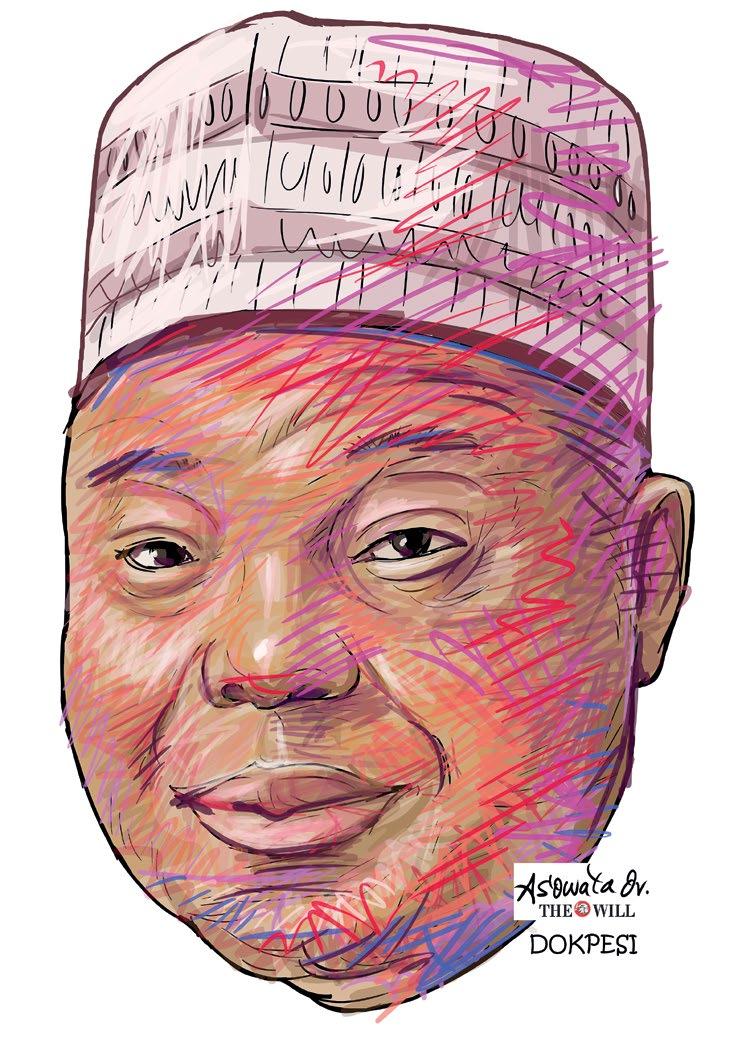
“We did not have a license yet, but we started broadcasting. And it was during Sani Abacha’s regime. One day, we suddenly heard an NTA news report which warned that ‘there is a radio station broadcasting illegally, off-air or we will deal with you decisively’. We went off the air for six months till August 15, 1994, when we were able to get a license. We fully came on air on September 1, 1994.”
With that, Dokpesi set about filling the void in the broadcast media in Nigeria, pointedly noting that Raypower “was to bridge a lack of proper information gap created by several government-run radio services. I have said that it was a lack of proper information. There was a need to be able to reach the people. Mind you, Raypower started at the height of the Nigerian crisis, during the Abiola saga.
“At that particular point in time, OGBC was not effective; there was the Federal Radio Corporation, but then, there was a yearning for something new, something fresh, and Raypower was able to come out at that point to meet that need. We had hoped that we would be able to expand and develop rapidly across the country, but unfortunately, there were various blockages and hurdles that were put in our way.” Obstacles or not, it didn’t stop Dokpesi from starting off a sister media organisation Africa Independent Television, in 1996, described by one reporter as a television station “with more youth-centric appeal with an array of entertainment programmes…a TV station credited for accelerating the popularity and influence of Afrobeats culture.”
Of course, Raypower and AIT caught on well with many a Nigerian youth, especially budding artistes who availed themselves of the opportunities presented by the stations to showcase their musical talents. With the likes of the stentorian voiced Steve “the Sleek” Kadiri anchoring programmes

JUNE 4, 2023 THEWILL NEWSPAPER • www.thewillnigeria.com PAGE 44 THEWILLNIGERIA THEWILLNG THEWILLNIGERIA
“
The man who started off the first private radio and television stations in Nigeria seemed the most unlikely person to do so
...New Ray in Nigerian Broadcast Media FEATURES



on Raypower 100.5FM, a dependable anchor Jato taking his turn on the popular AIT news programme Kakaaki, both media outfits soon became household names, made eternally so with jingles and promotionals such as “Africa Independent Television, Ogbonge TV, for dis kontri…Papa, Mama o, AIT na di station.”
Unlike other broadcast media companies located right in the heart of Lagos, AIT/ Raypower were in one vast ranch-like location straddling Lagos and Ogun states, some place called Alagbado. At the time, it was miles and miles of extensive bush punctuated by the imposing steely pylons which were the only signs of modernity in an otherwise forgotten region inhabited by farmers and hunters in search of game. Going to Raypower/ AIT then was like travelling to another country entirely. Houses were few and far between and you could barely glimpse the residents except the occasional sighting of a villager hanging a lifeless porcupine or a tongued-out antelope on a pole just by the roadside. If you asked, the hunter will direct you to a corner where you find locals quaffing frothy palm wine in thatched-roofed huts. Despite this distance, the media organisations Dokpesi founded grew in popularity becoming, at some point, the sole source of reliable information from government or out of it.
In his 2013 publication Minorities as Competitive Overlords, late columnist and author Jimanze EgoAlowes listed Raymond Dokpesi as one of the media moguls from the South-south whose pioneering role radicalised the broadcast media in Nigeria. Others are Nduka Obaigbena of THISDAY, Alex Ibru of The Guardian, Sam Amuka Pemu of Vanguard, Frank Aigbogun of Business Day and Ben Murray Bruce of Rhythm 93.7FM and Silverbird Television.
The privately-owned television station was a dream come true for couch potatoes and insomniacs. NEPA permitting, they could watch programmes to their heart’s content because both radio and television stations broadcast 24/ 7. It was a new era in broadcast journalism in Nigeria, an example other private television stations like Channels, the defunct DBN, MITV, Silver Bird and TVC will soon follow. And no one forgot who the pioneer or pacesetter was – the man from Agenebode in Edo state but who was born in Ibadan Oyo state on October 25, 1951, a man nobody gave chances of survival as a child let alone as media entrepreneur.
Early years
Much has been written about Dokpesi since his untimely demise on May 29, 2023, a day of “renewed hope” for newly sworn-in President Bola Ahmed Tinubu but certainly a great loss to family, friends and business associates of Dokpesi who was a card-carrying member of the opposition Peoples Democratic Party.
Though in opposing political camps with BAT of the All Progressives Congress, the president however sent a condolence message to the family, describing Dokpesi’s death as a “blow to the media industry where he has played pioneering roles in private broadcasting. His pacesetting investment in the industry is an inspiration to many who came after him. The history of the evolution of the Nigerian media industry will be incomplete without prominent mention of Dokpesi and his giant footprints on the media landscape. I express my sincere condolences to the management and staff of DAAR Communications and the family of the late media entrepreneur for this monumental loss.”
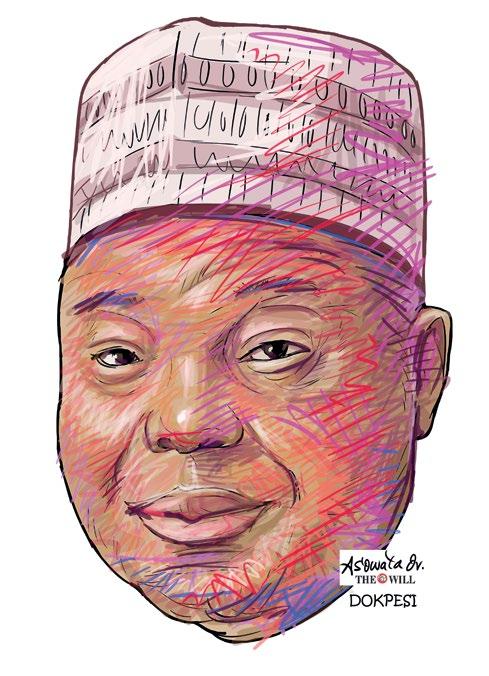
Shock was the word for Atiku Abubakar, presidential candidate of the PDP and close friend of Dokpesi. “Oh my God! I am in a state of shock,” Atiku lamented. “I am in Adamawa, scheduled to return midweek before I received this shattering piece of
news,” insisting that “you shouldn’t have left us on a date like this, Ezomo. But what can we do? As we say in Islam, from God, we came and to Him, we return. My everlasting and deepest condolences to his family, associates and admirers. May God forgive his sins and grant him paradise.”
Though reportedly convalescing from an illness, Dokpesi tripped on his treadmill while exercising on the morning of that fateful day. He was 71. By his own account, he had a long run on life. In one account to journalists, Dokpesi recalled that doctors in faraway Poland where he had his university education once told him he wouldn’t live past 35. Worse still, no one thought he would survive his childhood.
He was the only surviving son out of 13 children. He was hobbled from early on by recurring sickness on account of which he became “handicapped because I could not talk from the beginning of my life.” That experience left him with self-loathing, a condition worsened by an uncharitable declaration by a family friend urging his father to dispense with him because he wouldn’t amount to much in life, a never-do-well.
“My mother was very helpless at that time,” Dokpesi told journalists in 2021, “and here I was feeling very sick, unable to communicate freely. And my mother, too, was illiterate. So, here I was, I couldn’t talk, and even when I attempted to write anything, she could not read what I was writing.”
Under that crippling condition, the family sought the services of an expert on such matters. The solution to his problem required unorthodox treatment, as Dokpesi himself later recounted. “We went through the bank of River Niger, which was full at that time. We went into a small village, having travelled almost two and a half hours on the river; they called the village Osuneme. I was not given any injections. The people just came up to say I had been poisoned, and people who committed the atrocity were present.
“So, ‘here is water, if you are sure you are not the one responsible for the state of the health of this boy, and say, God, you have seen me.’ And one after the other, my father’s eldest sister, my father’s first wife, the lineage coincidentally were involved. I went into a fit again, where I was rolling and vomited. It was the same water that they were given that was given to me. So, I took that same water and vomited quite extensively different items from my abdomen.”
Once past those medical challenges, the only way for the young man was up and from then on, his path was pretty much carved out for him: professional work, politics, media and more involvement in politics up until 2019 and the last presidential election where he played prominent roles as a PDP heavyweight.
After his party’s loss to APC during the presidential polls in 2015, for instance, Dokpesi apologised for PDP’s mistakes, declaring thusly that “we are aware of the errors of the past 16 years. As human beings, we must have made mistakes and could not meet Nigerians’ expectations. For that, we tender an unreserved apology. Make no mistake. The PDP is aware that there were errors made along the way.”
An acceptance of guilt and slush funds he was reported to have received from the National Security Adviser, Sambo Dasuki, to President Goodluck Jonathan probably necessitated the anti-graft agency EFCC roping him in that same year. He was alleged to have been paid N2.1 billion by Dasuki, on account of which he was charged to court. A justice of the Appellate Court Elfrieda Williams-Dawodu in Abuja struck out the case on April 1, 2021.
His media station also had some run-in with the NBC for defaulting on tax returns. But it was obvious AIT had been on the sightline of the authorities since 2015 after it ran a particulalrly damaging documentary on Muhammadu Buhari APC’s presidential candidate at the time.
The founder of the first private radio and television stations in Nigeria had been in relative obscurity since then until news of his demise caught Nigerians unawares in late May, prompting outpourings of grief from friends and foes alike.
Outgoing Speaker of the House of Representatives and recently appointed CoS to President Tinubu, Femi Gbajabiamila has sent his condolence to the Dokpesis, so with other prominent politicians and Babajide Sanwo-Olu, governor of Lagos state. Dokpesi, Sanwo-Olu said, would be remembered for breaking the monopoly of governmentowned broadcasting in Nigeria. “On behalf of the Government and people of Lagos State, I mourn the passage of businessman and media guru, who contributed his quota to the economy of Lagos State by providing job opportunities for many young Lagos residents in the media sector.”
JUNE 4, 2023 THEWILL NEWSPAPER • www.thewillnigeria.com PAGE 45 THEWILLNIGERIA THEWILLNG THEWILLNIGERIA
“
The privately-owned television station was a dream come true for couch potatoes and insomniacs. NEPA permitting, they could watch programmes to their heart’s content because both radio and television stations broadcast 24/ 7
SportsLive
Overcoming Leadership, Governance Challenges in Nigeria's Sports Sector
 BY JUDE OBAFEMI
BY JUDE OBAFEMI
The Nigerian sports sector holds tremendous potential for making significant contributions to the nation's development and economy. However, various hurdles and, more importantly, a lack of credible, efficient and productive leadership within the sector hinder the realisation of this potential.
While recent initiatives, such as the National Sports Industry Policy (NSIP) offer hope for addressing funding challenges, it is imperative to critically analyse and address the pressing issue of leadership and governance to foster sustainable growth and success in the sector.
The effective administration of sports requires leaders who possess the necessary expertise, experience and integrity to drive the sector forward. Unfortunately, the absence of this has resulted in inefficient management, corruption and a lack of accountability. These issues undermine the sector's growth and hinder its ability to secure adequate funding, develop essential infrastructure, and provide necessary support for athletes.
While funding announcements, such as the N80 billion allocation over the next four years declared by the former Minister of Sports and Youth Development, Sunday Dare, appear promising, their impact is limited by the



absence of transparent and accountable management. Past instances, like the disappointment surrounding the limited reach of the N75 billion youth fund, which Dare himself bemoaned in April, highlight the urgent need for a credible and efficient governance mechanism that will ensure the equitable distribution and optimal utilisation of funds.
Without effective leadership and governance, the potential benefits of financial investments may not be fully realised, leaving the sector and its stakeholders in a state of continued struggle.
In this context, the NSIP, particularly the Sports as Business Policy, presents an opportunity to stimulate private sector participation and attract investment into the sports sector. However, the success of this policy relies heavily on credible leadership and efficient implementation. To fully leverage the potential of the NSIP and create a thriving sports industry, it is essential to address the underlying governance issues that have hindered progress thus far.
SportsLive aims to shed light on the critical need for credible, efficient, and productive leadership within the administration of sports in Nigeria by focusing on the challenges associated with leadership and governance. We explore opportunities for improvement, strategies to enhance governance mechanisms, and the potential benefits that can be achieved by establishing a transparent, accountable, and professional environment for sports administration. Only by addressing these issues head-on can Nigeria unlock the full potential of its sports sector, promote economic growth, and provide opportunities for the country's talented athletes while fostering a sense of national unity and pride.
Funding challenges have tainted the sector, no doubt. While the recent announcement of a N80 billion for the sports sector over the next four years is a positive development, there is a need for effective allocation and distribution of these funds. In the past, funds meant for sports development have often been misappropriated, leading to limited impact on the sector. Without proper oversight and accountability, the allocated funds may not reach the intended recipients and projects, hindering the overall progress of the sector. The lack of adequate investment in sports infrastructure is a significant hurdle for the development of the sector.
Many regions in Nigeria lack well-equipped sports facilities, training centers, and stadiums, which are crucial for nurturing talent and hosting national and international events. The limited availability of modern and accessible infrastructure restricts the growth of various sports disciplines and hampers the country's ability to attract major sporting events and investments. Athletes require substantial financial support to excel in their respective sports. Funding is crucial for training, coaching, equipment, and participation in national and international competitions.
JUNE 4, 2023 THEWILL NEWSPAPER • www.thewillnigeria.com PAGE 46 THEWILLNIGERIA THEWILLNG THEWILLNIGERIA
“
Athletes require substantial financial support to excel in their respective sports
Ex-President Muhamadu Buhari with former Minister of Sports, Sunday Dare, displaying the jersey of Team Nigeria.
... Challenges in Nigeria's Sports Sector
However, the current funding limitations often result in inadequate support for athletes, leading to suboptimal performance and a lack of motivation. Insufficient financial backing also limits athletes' ability to access specialised training programmes, international exposure, and necessary resources to compete at the highest level.
Additionally, the sports sector in Nigeria relies heavily on government funding, with limited engagement from the private sector. The absence of substantial private investments and sponsorships in sports development restricts the sector's growth and potential. Private sector involvement could bring additional funding, expertise, and innovative approaches to sports management and infrastructure development.
While Dare's efforts have seen initial interest from sponsors such as Nigerian Breweries, Air Peace, Cadbury, MTN, Emzor Pharmaceuticals, Aiteo, CocaCola, Revolution Plus, and Premier Lotto, many sponsors have turned their backs on sports, especially after Nigeria failed to qualify for the Qatar 2022 World Cup. Furthermore, there is often an unequal distribution of funds across different sports disciplines in Nigeria. Some sports receive more attention and financial support than others, leading to an imbalance in development and opportunities for athletes. This disparity can hinder the overall growth and competitiveness of sports in the country and limit the emergence of talent in underrepresented disciplines.
The sports sector in Nigeria has also faced challenges related to inconsistent funding and a lack of longterm planning. Without a well-defined and sustainable funding strategy, the sector struggles to execute longterm development programmes, provide consistent support to athletes and sports federations, and attract substantial investments. A robust long-term funding strategy would provide stability and predictability, enabling better planning and implementation of initiatives to drive sports development.
Addressing these funding challenges requires not only increased financial allocation but also effective management, transparency, and accountability in the distribution of funds. By addressing the gaps in funding and implementing sound financial practices, Nigeria can create an environment conducive to the growth and success of its sports sector. This is where the potential solution of the National Sports Industry Policy (NSIP) comes in.
The NSIP, with its Sports as Business Policy, holds significant potential to address funding challenges and promote private sector participation in the Nigerian sports sector. The NSIP recognises the importance of transforming sports into a thriving industry, attracting investments, and generating employment opportunities. However, the successful implementation of the NSIP requires more than just policy formulation; it necessitates credible, efficient, and productive leadership and
Continued from Back Page
SportsLive
and build a strong foundation for sustainable sports growth.
It is clear that the successful implementation of the NSIP requires efficient processes, transparent fund management, active engagement with the private sector, capacity building, collaboration with international bodies, and a focus on grassroots development. By prioritising credible and efficient leadership and governance, Nigeria can unlock the full potential of its sports sector and attract private investments, leading to economic growth and youth development.

Indeed, the administration of sports in Nigeria faces significant challenges in terms of credible, efficient, and productive leadership and governance. To change our sporting fortunes, there are areas of concern that we must work assiduously on.
It goes without saying that mismanagement and improper allocation of funds hinder the sector's growth and development. Transparent and accountable financial management systems are needed to ensure responsible allocation of resources. The absence of a comprehensive, long-term strategic plan, which is essential to guide sports development, set clear goals, and measure progress, has also plagued the sector. With the roadmap of the NSIP, it is hoped that the sector
governance within the sports administration.
To achieve this, several factors come into play: Efficient Implementation: Establish a well-coordinated approach with clear timelines, measurable targets, and effective monitoring mechanisms while ensuring transparent financial management and regular audits to build trust and attract private sector investment.
Public-Private Partnership: Actively engage with the private sector through strategic partnerships and collaborations; explore innovative financing models and offer incentives to encourage private sector involvement and expertise.
Capacity Building: Focus on training and professional development programmes for sports administrators to enhance their skills and knowledge in sports management, governance, and ethics.
Collaboration with International Bodies: Learn from international best practices and collaborate with international sports organisations to access resources, technical assistance, and guidance.
Grassroots Development: Allocate funds towards grassroots sports programmes to nurture young athletes
Subsidy Removal: What Nigeria Labour Congress, Government Must Do

only contribute to sustainable development but also reduce the vulnerability of the economy to global oil price shocks. It will also help businesses, heavily reliant on power supply, cut costs, cuts which can translate to more profits and more money in more pockets.
Additionally, the government should prioritise fiscal discipline by reducing wasteful spending, streamlining bureaucracy, and implementing sound economic policies. This will help alleviate the financial strain and create a more sustainable economic environment. By optimising revenue collection and reducing leakages, the government can create room for investments in critical sectors and social programs.
To foster understanding and support for the subsidy removal, the government should launch a comprehensive public awareness campaign to educate citizens about the rationale behind the decision, its
long-term benefits, and the accompanying measures to alleviate its impact. This campaign should include town hall meetings, media engagements and the use of social media platforms to ensure broad outreach and effective communication.



I know that our country is a complex one to govern because of the multiple powerful interests, but Tinubu must be bold, resolute and decisive in making and implementing decisions that are for the overall good. The removal of fuel subsidy is a popular decision, however, his government must work closely with state governments and local governments to find ways to get help across to those who really need them.
By addressing the challenges head-on and implementing comprehensive reforms, Nigeria can navigate this transition successfully and build a stronger foundation for its economic future.
country has faced in achieving meaningful and sustained results.
Furthermore, effective talent identification programmes and grassroots development initiatives are necessary to nurture young athletes. A systematic approach to identifying and training talent will help Nigeria harness its potential in sports. In addition, improved governance structures within sports federations and governing bodies are crucial. Leadership positions should be filled by experienced professionals, and term limits should be implemented to promote fresh perspectives and prevent the concentration of power.
Also, meaningful involvement of athletes, coaches, sports associations, and the private sector in decisionmaking processes is essential. Regular dialogue and consultation with stakeholders will foster ownership, diverse perspectives, and effective decision-making.
Comprehensive monitoring and evaluation mechanisms are also necessary to assess the impact of sports programmes and initiatives. Regular evaluation will enable evidence-based decision-making and ensure resources are allocated effectively.
Addressing these issues will contribute to the sustainable growth and success of Nigeria's sports sector and ensure that the N80 billion investment over the next four years, as declared by Dare, yields desirable results in the sports sector for the benefit of all and the glory of the country.
JUNE 4, 2023 THEWILL NEWSPAPER • www.thewillnigeria.com PAGE 47 THEWILLNIGERIA THEWILLNG THEWILLNIGERIA
Dare
Subsidy Removal: What Nigeria Labour Congress, Government Must Do




The Bola Ahmed Tinubu Administration has encountered a significant challenge as it begins its tenure. During his inauguration, Tinubu announced the complete removal of the fuel subsidy, a highly controversial but popular policy that has resulted in high prices and long queues for fuel across the nation. The policy is set to take effect on July 1, but the announcement has already caused chaos as Nigerians rush to buy fuel before the prices increase further.
In the immediate aftermath of the crisis, oil marketers have backed the move amid the assurances provided by the Nigerian National Petroleum Company Limited (NNPCL) and the Nigerian Midstream and Downstream Petroleum Regulatory Authority on the availability of products. However, the Nigeria Labour Congress (NLC) and its affiliated unions have declared a mass protest against the immediate implementation of the removal.
The NNPCL, the sole importer of fuel into the country, has assured the public of ample fuel supply. It has also promised close collaboration with the Nigerian Midstream and Downstream Petroleum Regulatory Authority and relevant stakeholders to ensure a smooth transition.

Furthermore, the oil marketers stressed that the decision to phase out the fuel subsidy regime went beyond a mere fiscal reform. They viewed it as a substantial step towards achieving social justice.
With the announcement, fuel price jumped from the previous official pump price of N185 to a range between N350 and N550 (or worse in certain parts of the country because of a price chart from the NNPCL that emerged to cut down the excesses of some petrol filling stations).
This price hike is anticipated to have significant economic consequences in Nigeria, where 133 million people live in multidimensional poverty, according to the country's own National Bureau of Statistics. The sudden increase in fuel prices is already directly impacting transportation costs, food prices and overall living expenses, disproportionately affecting the vulnerable segments of society. Unsurprisingly, this move has been met with widespread unpopularity among citizens, sparking protests and unrest.
To understand the context, Nigeria's fuel subsidy is a system where the Federal Government shoulders the majority of the costs of fuel imports, reducing the costs paid by consumers. Nigeria's oil is refined in Europe and imported back to the country, contributing to the high costs. The subsidy was initially introduced in the 1970s to alleviate the impact of rising global oil prices and subsequent administrations attempted to remove it but faced opposition due to its popularity among citizens. Over time, the subsidy became a heavy burden for the government as the costs escalated while private pockets have been fattened by the fraud that the subsidy regime has enabled. The removal of the subsidy became a major issue in January 2012 when the then President Goodluck Jonathan announced its removal, resulting in fuel price increases and sparking widespread protests. The protests, organised by labour unions, civil society groups and opposition party leaders, including the now-President Tinubu, brought the country to a
standstill, leading to a partial reduction in fuel prices and the reintroduction of the subsidy. The subsidy system has been plagued by corruption and a lack of transparency, with instances of fraud and calls for investigations into the NNPCL and subsidy payments to oil marketers.
on those living in poverty. The local government councils and community leaders have a key role to play here.
Additionally, implementing programmes to enhance skill development and create employment opportunities can help alleviate the long-term effects of subsidy removal.
Many state governments already operate mass transit services within their metro areas. The governments should, as a matter of urgency, increase their fleet by adding more fuel efficient buses and make the cost of commuting cheaper.
The government must immediately begin to engage in negotiations with the NLC and its affiliates to address the concerns of workers who may face wage stagnation and increased costs of living. It is crucial to ensure that the burden of subsidy removal is not disproportionately placed on workers and their welfare is protected during this transition. Workers must earn a decent and realistic wage. Recently, it came to light that there have been selective salary increments at the federal level.
This was revealed via a protest by the Colleges of Education Academic Staff Union (COEASU), which rejected the Federal Government's decision to exclude certain workers, including lecturers and tertiary institution workers, from the recent salary increase. According to COEASU, this action is an attempt to divide Nigerian workers and create confusion within the system.
In the run-up to the February 2023 presidential election, all three major presidential candidates, including Tinubu, promised to remove the subsidy and implement oil sector reforms.
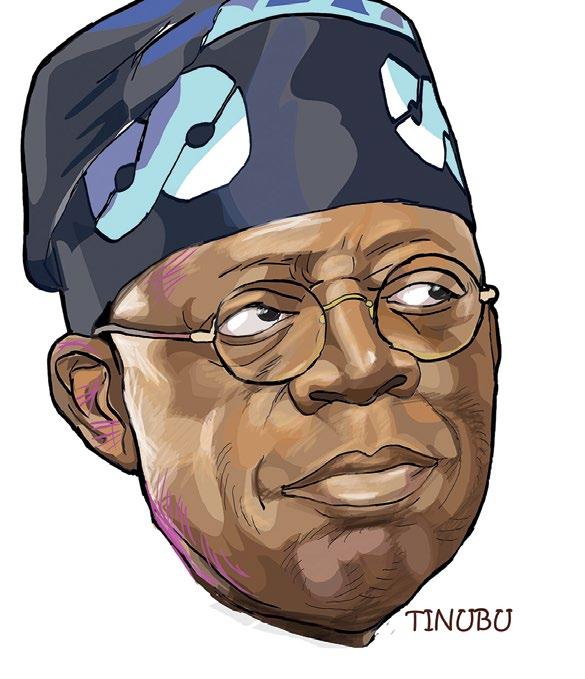
Experts argue that the subsidy has become a significant financial burden, particularly considering Nigeria's economic reality. The previous administration left a substantial debt of N77 trillion ($167 billion) to local and foreign creditors, with a large portion of the government's revenue being used to service the debt. Continuing subsidy payments could worsen the government's cash crunch, hinder economic growth and limit its ability to invest in critical sectors, such as education, healthcare and infrastructure. However, a haphazard, ambiguous removal of the subsidy, however well-intentioned, is just as bad. That is why, although I have been a longtime advocate of an end to the fraudulent subsidy programme, I want to recommend a series of actions to help with cushioning the effects of the enduring crisis and ensuring a smooth transition to a non-subsidy period. For starters, the government should establish comprehensive social safety nets to support vulnerable populations affected by the fuel price increase. This includes targeted food subsidies and very low cost quality healthcare to mitigate the immediate impact
Such selective treatments only engender distrust of government, which is antithetical to unity and oneness. It behoves on Labour to fight against such practices. As the party with the most to lose, Labour must fight, not against the removal of subsidy, but for better pay, more money in the pockets of workers, reduction in government wasteful spending, tax incentives for workers, an efficient PAYE system, improvement of power supply and cost-cutting measures across board. They must task government to improve the trust from the masses that fuels a workforce towards productivity.
To rebuild public trust, government should prioritise transparency and accountability in the management of petroleum revenues. This includes conducting independent audits of the NNPCL and subsidy payments to eliminate corruption and ensure that the savings from subsidy removal are reinvested in critical sectors of the economy.
Nigeria has long relied heavily on oil revenues, making the economy vulnerable to fluctuations in global oil prices. The government must also focus on diversifying the economy by promoting sectors such as agriculture, manufacturing, technology and tourism. This diversification will create new job opportunities, stimulate economic growth, and provide alternative sources of income.

Alongside subsidy removal, government should prioritise comprehensive reforms in the energy sector. This includes investing in renewable energy sources such as solar and wind, improving power infrastructure, and promoting energy efficiency measures to reduce reliance on petroleum products. This will not
Continues on Page 47
PAGE 48 THEWILLNIGERIA THEWILLNG THEWILLNIGERIA www.thewillnigeria.com • June 4, 2023
For starters, the government should establish comprehensive social safety nets to support vulnerable populations affected by the fuel price increase. This includes targeted food subsidies and very low cost quality healthcare to mitigate the immediate impact on those living in poverty

























































































